#why its one of the most quoted lines in film history
Text
"The studios thought they could handle a strike. They might end up sparking a revolution"
by Mary McNamara
"If you want to start a revolution, tell your workers you’d rather see them lose their homes than offer them fair wages. Then lecture them about how their “unrealistic” demands are “disruptive” to the industry, not to mention disturbing your revels at Versailles, er, Sun Valley.
Honestly, watching the studios turn one strike into two makes you wonder whether any of their executives have ever seen a movie or watched a television show. Scenes of rich overlords sipping Champagne and acting irritated while the crowd howls for bread rarely end well for the Champagne sippers.
This spring, it sometimes seemed like the Hollywood studios represented by the Alliance of Motion Picture and Television Producers were actively itching for a writers’ strike. Speculations about why, exactly, ran the gamut: Perhaps it would save a little money in the short run and show the Writers Guild of America (perceived as cocky after its recent ability to force agents out of the packaging business) who’s boss.
More obviously, it might secure the least costly compromise on issues like residuals payments and transparency about viewership.
But the 20,000 members of the WGA are not the only people who, having had their lives and livelihoods upended by the streaming model, want fair pay and assurances about the use of artificial intelligence, among other sticking points. The 160,000 members of the Screen Actors Guild-American Federation of Television and Radio Artists share many of the writers’ concerns. And recent unforced errors by studio executives, named and anonymous, have suddenly transformed a fight the studios were spoiling for into a public relations war they cannot win.
Even as SAG-AFTRA representatives were seeing a majority of their demands rejected despite a nearly unanimous strike vote, a Deadline story quoted unnamed executives detailing a strategy to bleed striking writers until they come crawling back.
Days later, when an actors’ strike seemed imminent, Disney Chief Executive Bob Iger took time away from the Sun Valley Conference in Idaho not to offer compromise but to lecture. He told CNBC’s David Faber that the unions’ refusal to help out the studios by taking a lesser deal is “very disturbing to me.”
“There’s a level of expectation that they have that is just not realistic,” Iger said. “And they are adding to the set of the challenges that this business is already facing that is, quite frankly, very disruptive.”
If Iger thought his attempt to exec-splain the situation would make actors think twice about walking out, he was very much mistaken. Instead, he handed SAG-AFTRA President Fran Drescher the perfect opportunity for the kind of speech usually shouted atop the barricades.
“We are the victims here,” she said Thursday, marking the start of the actors’ strike. “We are being victimized by a very greedy entity. I am shocked by the way the people that we have been in business with are treating us. I cannot believe it, quite frankly: How far apart we are on so many things. How they plead poverty, that they’re losing money left and right, when giving hundreds of millions of dollars to their CEOs. It is disgusting. Shame on them. They stand on the wrong side of history at this very moment.”
Cue the cascading strings of “Les Mis,” bolstered by images of the most famous people on the planet walking out in solidarity: the cast of “Oppenheimer” leaving the film’s London premiere; the writers and cast of “The X-Files” reuniting on the picket line.
A few days later, Barry Diller, chairman and senior executive of IAC and Expedia Group and a former Hollywood studio chief, suggested that studio executives and top-earning actors take a 25% pay cut to bring a quick end to the strikes and help prevent “the collapse of the entire industry.”
When Diller is telling executives to take a pay cut to avoid destroying their industry, it is no longer a strike, or even two strikes. It is a last-ditch attempt to prevent le déluge.
Yes, during the 2007-08 writers’ strike, picketers yelled noncomplimentary things at executives as they entered their respective lots. (“What you earnin’, Chernin?” was popular at Fox, where Peter Chernin was chairman and chief executive.) But that was before social media made everything more immediate, incendiary and personal. (Even if they have never seen a movie or TV show, one would think that people heading up media companies would understand how media actually work.)
Even at the most heated moments of the last writers’ strike, executives like Chernin and Iger were seen as people who could be reasoned with — in part because most of the executives were running studios, not conglomerations, but mostly because the pay gap between executives and workers, in Hollywood and across the country, had not yet widened to the reprehensible chasm it has since.
Now, the massive eight- and nine-figure salaries of studio heads alongside photos of pitiably small residual checks are paraded across legacy and social media like historical illustrations of monarchs growing fat as their people starve. Proof that, no matter how loudly the studios claim otherwise, there is plenty of money to go around.
Topping that list is Warner Bros. Discovery Chief Executive Davd Zaslav. Having re-named HBO Max just Max and made cuts to the beloved Turner Classic Movies, among other unpopular moves, Zaslav has become a symbol of the cold-hearted, highly compensated executive that the writers and actors are railing against.
The ferocious criticism of individual executives’ salaries has placed Hollywood’s labor conflict at the center of the conversation about growing wealth disparities in the U.S., which stokes, if not causes, much of this country’s political divisions. It also strengthens the solidarity among the WGA and SAG-AFTRA and with other groups, from hotel workers to UPS employees, in the midst of disputes during what’s been called a “hot labor summer.”
Unfortunately, the heightened antagonism between studio executives and union members also appears to leave little room for the kind of one-on-one negotiation that helped end the 2007-08 writers’ strike. Iger’s provocative statement, and the backlash it provoked, would seem to eliminate him as a potential elder statesman who could work with both sides to help broker a deal.
Absent Diller and his “cut your damn salaries” plan, there are few Hollywood figures with the kind of experience, reputation and relationships to fill the vacuum.
At this point, the only real solution has been offered by actor Mark Ruffalo, who recently suggested that workers seize the means of production by getting back into the indie business, which is difficult to imagine and not much help for those working in television.
It’s the AMPTP that needs to heed Iger’s admonishment. At a time when the entertainment industry is going through so much disruption, two strikes is the last thing anyone needs, especially when the solution is so simple. If the studios don’t want a full-blown revolution on their hands, they’d be smart to give members of the WGA and SAG-AFTRA contracts they can live with."
#sag-aftra strike#sag strike#fans4wga#writers guild strike#actors guild strike#union solidarity#wga strong#i stand with the wga#wga strike#writers strike
7K notes
·
View notes
Text
weekend wip game
Rules: List your WIPs below (if you only write one fic at a time, feel free to include future WIPs/ideas!) then answer the following questions. Then, tag as many people as you have WIPs (or more).
Thanks to @welcometololaland for kicking this off, plus @liminalmemories21, @rmd-writes, @lemonlyman-dotcom, @orchidscript, @alrightbuckaroo, and @heartstringsduet for the tags!
1. WIP List:
had we but world enough (and time) (the TiMER fic)
a strong enough foundation (followup to tbah in the Roots Before Branches series, aka “five times Morgan was just like her daddy, and one time she was all her papá”)
for better, for worse (bachelor party shenanigans)
we were emergencies (the It’s a Wonderful Life/Sliding Doors-esque TK AU)
the same in every language (five times Carlos says something in Spanish during sex and one time TK understands)
show me the steps so i can go through the motions (4x18 Carlos & Gabriel tag)
our hearts are haunted by the ghosts that i made (the no coma AU that angst built)
Still Sadly Untitled Phone Fic (five times Tarlos had to replace a phone)
Untitled HGTV AU
Untitled [Film] Fusion
Untitled Breakup Era Hookup (accidental club run-in where Jealous TK Makes Choices)
Untitled [Redacted] AU (collab with @ambiguouspenny)
The One Where Carlos Gets Shot
…do you know how happy I am that to build a home is not on this list?
2. Which of your WIPs is currently the longest?
The TiMER fic! It wasn’t even supposed to be second in line, it just bullied its way to the top of the list.
3. Which WIP do you expect will end up the longest?
Oof. If I didn’t know myself so well, I’d say we were emergencies, but since I do, it’ll probably be the HGTV fic.
4. Which WIP is your favourite to write/the most enjoyable to write? Why?
The TiMER fic has been a lot of fun to write, despite it being hurtier than I intended, but I think that’s just down to being in TK’s head for the first time. But every single snippet of for better, for worse makes me grin like a loon without fail, so it’s that one, hands down.
5. Which WIP do you find the most intimidating to write? Why?
Hat trick for the TiMER AU. I think I was so excited about the premise and the possibilities of it all — I’ve wanted to write a TiMER fic since I first saw the movie, and a Soulmates fic for even longer — I didn’t really stop to consider that, after ~64k of building on and in-between canon, I was going to have to… build on and in-between canon. There’s a substantial element of re-imagining for this one, just because of the nature of the TiMER as a literal plot device, but there are times I’m still like fuuuuuck, I have to do this thing completely differently now.
6. Which WIP do you experience the most self-doubt about. Why?
the same in every language. It’s not a plot-what-plot, it’s literally sex as plot, and I’d be lying if I said I wasn’t worried about making it work.
7. Which of your WIPs will you seek out a beta/sensitivity reader for? Why?
Both for better, for worse and we were emergencies will need outside attention to make sure they’re working as planned, and I’ll definitely be enlisting @hoko-onchi-writes’ Smutmancer services to make sure the same in every language is worth anything at all.
8. Have any of your WIPs been struck by the curse of writer's block?
I’m just laughing right now. That’s my answer.
9. Which WIP has your favourite OC? Tell us about them?
Definitely we were emergencies. His name is Simon, he’s a vet (as in healer of animals, not former military man, but he has Seen Some Things in his particular line of work so the latter isn’t far off), and he has a history with Carlos that he’d very much like to be a future with Carlos. He’s also totally scruff-and-curls era Zane Phillips in my head, and both @ambiguouspenny and I are sort of shamelessly infatuated with him. To quote Tay, after being virtually introduced to Dr. Simon: “do you even like TK?”
10. Which WIP is the sexiest?
One would think it’s the aforementioned fic where sex is the plot, but the TiMER fic has some moments, y’all.
11. Which WIP is the angstiest?
I mean, pick your poison. As I said, the TiMER fic is angstier than intended. The Breakup Era Hookup will be hot angst, but angst nonetheless. There’s one where Carlos gets shot. And I know it sounds like show me the steps so i can go through the motions might be an obvious answer, considering The Gabriel Factor, but the real winner is probably our hearts are haunted by the ghosts that i made. I told Tay the actual premise and they threw me in angst jail.
12. Which WIP has the best characterisation (in your humble opinion)?
a strong enough foundation is a real contender here, because it’s the Carlos I already know and love, but I think it might actually be for better, for worse, simply because it’s all of Team Tarloft, and I have something of a knack for ensemble fics, if I do say so myself.
13. Which WIP has the best scene setting (in your humble opinion)?
Either the HGTV fic or the Untitled Film Fusion. Probably the former, because pretty pretty interiors are like porn for me.
14. Which WIP have you worked the hardest on?
Surprising no one, the TiMER fic. Snippets aside, I’m a “one WIP at a time” kind of girl.
15. Which WIP do you have the highest expectations for? Why?
In a weird way, I think this is usually the fic I’m currently working on. Some Yuletide fic aside (mostly pinch hits and quick treats), I always want to feel like whatever I’m writing is the best thing I’ve done — that way I get the sense that I’m growing. That said, though I’ve written a kid in fic (Teddy from The Magicians), I have never written kidfic, and the plan I have for a strong enough foundation makes me really excited.
16. Do you dream about any of your WIPs?
Not the actual fics, no, but I do dream about characters.
17. Do any of your WIPs have particular complexities that your other fics don't?
our hearts are haunted by the ghosts that i made has to tread some very thin ice, due to its premise, and I’m hoping I can find the right balance with it. And that it doesn’t make people hate me.
18. Which WIP is the funniest or has the most humour?
for better, for worse. And it’s not even close.
19. Do any of your WIPs contain outside POVs or a deep dive on a character other than the main ship? How are you finding that process?
The Untitled Phone Fic has an outsider POV! An OC outsider, even. She’s an overworked, underpaid girl named Kelsey, and she’s sort of precious. This one’s still in early stages, just an outline and a handful of snippets, but Kelsey is very clear in my head.
20. Tell us one thing we don't know about one or more of your WIPs.
One involves an unreliable narrator, one involves an inanimate object as a running theme, and one involves revenge.
I am so very late to this, so consider it an open tag for anyone who’d still like to talk WIPs!
14 notes
·
View notes
Text
Treasure Planet (2002)
The year 2002 was a weird time for the Disney animation studios, to put it mildly. After the legendary stretch of films that constituted the Disney Renaissance-The Little Mermaid, Beauty and the Beast, Aladdin, The Lion King-the yearly animated offerings were still making money, but they largely weren’t outright phenomenons anymore. Worse, competition had arisen both within and without: Pixar had totally changed the game with 1995′s revolutionary Toy Story, but the fancy new CGI bells and whistles were making more money than the studio’s traditional 2D animation and seemingly had more staying power to boot. Former studio chairman Jeffrey Katzenberg had left to form DreamWorks with legends Steven Spielberg and David Geffen thanks to a highly publicized power struggle with CEO Michael Eisner after the 1994 death of company president Frank Wells. They were succeeding too, with 2001′s Shrek being a (ahem) monster hit in particular. Eisner’s grip on the Magic Kingdom was slipping after this and other costly blunders like the creation of Euro Disney/Disneyland Paris, and he knew it. In the middle of all this, one of the most expensive films in the company’s history, a passion project for directors Ron Clements and John Musker, was nearing the end of production: a sci-fi adaptation of Robert Louis Stevenson’s classic adventure novel Treasure Island. How does it hold up? Well, if you’re like me and grew up with this, Atlantis: The Lost Empire, and The Road to El Dorado on loop, the answer is “I cannot be remotely objective about that”, but let’s get down into the nitty gritty on why this movie rules.
I suppose in one sense, I don’t necessarily have to offer a plot summary. If you’ve somehow gone your entire life without knowing the basics of Treasure Island and its myriad adaptations, I’d love to see the realtor quote on the rock you’re staying under. Disney itself is no stranger to the property as a studio. The book served as the basis for Walt’s first big swing into live action territory in 1950, and quite a good one at that in its surprisingly faithful rendering of Stevenson’s red-blooded adventure. Not the least of which was Robert Newton’s immediately iconic, gloriously hammy West Country accent-fied portrayal of Long John Silver; if you’ve ever wondered why movie pirates sound the way they do, he’s patient zero. And of course there’s Muppet Treasure Island, a childhood favorite that has a surprising amount in common with Planet in terms of some of its adaptation choices (namely, making Mr. Arrow a stern, professional sailor rather than the drunken layabout of the novel).
Where Planet benefits the most is the meta-knowledge one is bringing to the story and updating it to fit within the lines of a modern feature film. Structurally, it’s fairly faithful as we meet Jim Hawkins (Joseph Gordon Levitt, still most famous for 3rd Rock from the Sun at the time) at the Benbow Inn and he obtains the fabled treasure map from Billy Bones (Patrick McGoohan, giving us a great death rattle in about 2 minutes of screentime), thus prompting a treasure voyage. But even in this early stage, there are smart changes: Dr. Doppler (David Hyde Pierce) is a combination of Dr. Livesey and Squire Trelawney so we can cut down on characters, for instance.
And most crucially, rather than a pre-teen, Jim is now a teenaged delinquent whose father abandoned him and his mother Sarah (Laurie Metcalf); the thirst for adventure and Treasure Planet itself is established in a tooth-rottingly sweet prologue, but now we have extra context and motivation in addition to the destruction of the inn. Jim wants to make his mother proud and feel like he’s worth something. Then, when we get to the ship, not only do we get the great reinvention of Captain Smollet in Amelia (Emma Thompson at her Emma Thompson-iest), Silver (Brian Murray) too is enriched by foreknowledge. Silver’s treacherous intentions are laid bare within minutes of meeting him rather than saving that turn for Stevenson’s famous apple barrel scene. But this adds tension rather than subtract. Now we wonder less that Silver WILL turn mutinous and more what it means for his and Jim’s relationship; the apple barrel becomes a lightning rod. He becomes an even more intriguing character as a result, one of the few genuinely morally ambiguous villains in Disney’s history that makes some surprising choices by the end.
If there’s one arguable flaw in the adaptation, it’s the depiction of B.E.N. (Martin Short), a robotic take on Flint’s old crewmate Ben Gunn. He’s a clever idea conceptually, especially with the angle of his missing memory circuit that hides a deadly reveal, and I like his gangly CGI animation. But he fits into a trend Disney was leaning into in terms of trying to recapture the lightning in a bottle that was Robin Williams’ Genie in Aladdin where they hired big comedy actors to come in and riff as the sidekicks so that they could boost the trailers with funny bits and ensure the parents their kids wouldn’t be bored. Sometimes this worked out splendidly (Eddie Murphy’s Mushu in Mulan is as iconic as his Axel Foley or Donkey in Shrek, Rosie O’Donnell and Wayne Knight fit in shockingly well in Tarzan), other times...less so (hi gargoyles in Hunchback and Dave Thomas and Rick Moranis just doing Bob and Dave McKenzie again as the moose in Brother Bear). To be clear, there’s nothing outright wrong with the character as presented. I think Short is a deserved comedy legend who also really needs clear direction so he doesn’t get lost in a sea of hamminess, but this is certainly a better showing of his eager-to-please neuroses than the likes of The Pebble and the Penguin. And he only comes in at the third act point, so there’s less time for him to feel jarring. But he doesn’t feel strictly necessary in retrospect, especially when the movie is already funny in cleverer ways (”Well, uh... thank you. Thank you very much! Well, I have a lot of help to offer anatomically— amanamonically— as-astronomically face smack“), and we have a Designated Kid Appeal Merch Sidekick in the form of Morph. Two feels like pushing it.
Of course, even if the story had been merely okay instead of better than average, this would still be one of the most visually striking films the studio’s ever released. Taking cues from the Brandywine school of illustration, the colors are lush and rich, and the alien character designs are appropriately outsized on such a grand stage. The action scenes are clever and creative throughout, especially the escape from the inevitable mutiny and a nail-biting outrun-the-clock climax. The CGI integration is a little easier to spot 20 years on, but the Deep Canvas process allows for all manner of imaginative spacefaring visuals, the Victorian-by-way-of-Star-Trek aesthetic (sailing ships in outer space is exactly the level of FUCKING AWESOME it needs to be), and especially Silver’s cyborg limbs married to his broad 2D frame.
Though it certainly helps when you have master animator Glen Keane supervising one of his best performances, marrying the subtlety and grace he’d achieved with characters like Aladdin and Tarzan with the bravado of his earlier villains like Ratigan or Sykes in Oliver & Company. Under his hands, Silver can go from garrulous and brash to quiet menace or reflection in the blink of an eye. John Ripa (recently co-director on Raya and the Last Dragon) has a tougher assignment with Jim considering he’s something of a straight man, but he rises to the occasion with touches like a ‘face mask’ adding to Jim’s brooding nature that gradually fades as he opens up emotionally. Ken Duncan adds another great heroine to his quiver after Megara and Jane in Amelia, especially with the cat-like features, and Sergio Pablos’ Doppler is frequently a comic highlight with his wild gestures and facial grimaces that anticipates the animator’s work on Klaus.
Things are equally great on the aural end. A year after his iconic work on Atlantis, James Newton Howard gives us another great old-school adventure score with Celtic/Gaelic influences that also gets rockin’ at points with electric guitars punctuating Jim’s most awesome moments. Yes, it’s very XTREEEME and 2002, no, I do not care. (YMMV more on John Rzeznik’s “I’m Still Here” musical montage, but I think it’s awesome) The voice cast is also well chosen in its mix of then-current-stars and more unusual talent. Levitt, as with Ripa’s animation, opts to underplay, but he’s far from flat and manages some moving moments of tenderness and anger. Murray, primarily a theater actor in life, goes for the opposite approach, marrying big theatrical emotions with Silver’s larger-than-life personality, but never loses sight of the character and is quite affecting in the film’s denoument. Pierce inevitably brings a bit of his Niles Crane to Doppler, but since that’s one of the best sitcom characters in history, I can hardly complain, and he gets the lion’s share of the film’s most memorable lines, including a priceless Star Trek shoutout. Thompson is stiff-upper-lip dry wit personified, and she gives an interesting tinge to a budding romance in the latter portions of the film. Metcalf only has a few key scenes, but builds an effective portrait of a struggling single mother within them; thanks to her, you really end up rooting for Jim and Sarah to make amends. Rounding out the numbers are Michael Wincott giving a scary-ass pirate filter to his iconic gravel-pit voice as the villainous Scroop (who gets a memorable spin on the typical Disney villain death-by-falling trope), Roscoe Lee Browne’s stentorian bass giving Arrow a do-not-fuck-with-this-guy dignity, and ringers like Corey Burton and Rodger Bumpass as a pair of robo-cops.
Treasure Planet’s story had a bit of a sad ending at first. Unlike the same year’s immediate hit Lilo & Stitch, it was a notorious flop financially, especially given how expensive it was to produce, and hastened the death of big 2D theatrical films at the studio who pioneered them. But it’s lived on admirably, and even with its flaws (I think we also could have done without the fart noises alien), I count it among my favorites. I miss this period of Disney theatrical animation, where strict formula gave way to experimentation and weirdness. We should do that again every so often.
7 notes
·
View notes
Text
In Defense of Witches by Mona Chollet

“To be a witch is to be a subversive in the eyes of the law,” she says, in her deep voice. “It is to create another law.”- bisexual feminist activist Thérèse Clerc
[Please note this review like the book covered includes discussion of misogyny, sexism, murder, childbirth, sex, age gaps, ageism, offensive language, cultural appropriation, mentions of child sex abuse and incest.]
In Defense of Witches by Mona Chollet, the English forward by Carmen Maria Machado, and author’s introduction opens with the question of considering the image of the witch which marks one’s mind. Giving their own personal examples from pop culture, Chollet as well discusses scores of others. One referenced by Chollet I’ve also recommended before the historical fiction book I, Tituba Black Witch of Salem.
Yet, perhaps crucially I’ve been further fortunate, despite culture that demonizes, to know contemporary witches of different traditions, since I was young, eventually finding myself on a path. What is a witch as a symbol and identity is the sort of crux of where Chollet’s book is dancing a fine line. One can seemingly find the witch in every form, fashion and again even feminist these days. Though some of course more visible and fantastic than others. Yet, there is little questioning of the phrase given nod in the book of “We are the granddaughters of the witches you couldn’t burn”. So, what follows Chollet’s introduction, are four chapters grouping her personal feminist essays with spare nods to the witch. Along with acknowledgements of the effects of capitalism, commodification, racism, it is misogyny where Chollet’s book is most concerned with what has been handed down. She chooses to write about nonconformity be it women who are sexually free, unmarried, childless, aging, or au fait with nature.
The book first entitled Sorcières : La puissance invaincue des femmes attracted quite the attention and sales in France when it was originally published in 2018. Now as In Defense of Witches: The Legacy of the Witch Hunts and Why Women Are Still on Trial translated to English by Sophie R. Lewis in 2022. Coming in at an average length, almost eight hours long, alas it felt even more drawn out. Have the last four years since this book was published originally just been that long? Maybe. But it’s also that there’s been much (varied) gender analysis about the witch hunts since at least the 1970s nor, is Chollet the first to make a more contemporary thesis of it. For example, Witchcraze: A New History of the European Witch Hunts by Anne Llewellyn Barstow, another popular flawed book has been critiqued since its publication in the 1990s, and garners many citations in Chollet’s book. Too Chollet quoting from the 1862 La Sorcière by Jules Michelet, a book parts erroneous, eminently ideological, and reminder the witch can be used to talk about, more whatever one wants to talk about. (Inspired by it a culture away, I admit an artistic soft spot for the 1973 Japanese adult animated film Belladonna of Sadness. [NSFW: nudity, rape]) Part of the trouble is Chollet’s statements can be wide while the arguments or evidence can be at odds or narrower in scope. Then as can plague nonfiction books, especially with a new edition, I certainly also ask where is a fact checker?
Take this:
I once saw a single father invited to describe the shape of his day, and, another time, a gay mother, but in the vast majority of cases only heterosexual women are asked to contribute. This is understandable, in the sense that they are the majority of those struggling to balance the demands of their lives with children, but it also contributes to normalizing this situation—and skirts around the profound social injustice of it. (Footnote 113. To date, there is no study done on the division of labor within same sex couples’ households.)
Untrue, this 2015 study on gay fathers, further has previous references covering division of labor for gay and lesbian families. Trans or nonbinary parents, too? Why yes, this research article is newer for 2020 but, again look at the previous dated references involving different queer couples.
Also regarding footnotes, added URLs can be improperly formatted. One example the misogynistic and child sexual abuse allegations against Woody Allen. The 2014 Vanity Fair article was specifically included for English readers.
Then, let’s talk childbirth:
As for the forceps, they were invented much earlier, in the sixteenth century, by Peter Chamberlen, a Huguenot migrant living in England.
[…]
Yet there is much in need of change, starting with the standard birth position: lying on your back is in fact the least convenient position for both woman and infant, for it deprives them of gravity’s help. Uruguayan doctor Roberto Caldeyro-Barcia calls it the worst conceivable position “except for being hanged by the feet.” Certainly it suits only one of those present: the practitioner, who can sit or stand between the laboring woman’s legs, from whom he steals the show. It is, in fact, equivalent to the missionary position in sexual intercourse, each being considered the only “appropriate” position, setting up “an active and hard-working man over a passive woman, preferably spread flat like a starfish.” It is revealing that, in 1663, when his mistress Louise de la Vallière was preparing to give birth, King Louis XIV is said to have asked the doctor to lay her on her back “so he could watch the birth while remaining hidden behind a canopy.” As ever, the obsession with surveillance … Five years later, the King’s doctor, Mauriceau—the same man to whom Hugh Chamberlen had given his failed demonstration of the forceps—recommended this position in his influential treatise on giving birth.
Chollet, who decided not to have children, relies heavily on Marie-Hélène Lahaye. A French lawyer, voice in France about medical abuse and mistreatment, with a famous blog on childbirth. Further writing a 2016 book Accouchement: les femmes méritent mieux that calls for being informed and empowered. Great. Except we also need to look closer here at the evolution of birthing positions and other practices. If Peter Chamberlen revived the forceps from centuries previous, is it truly inventing? Also Mauriceau did recommended the woman take to a bed but in a semi-recumbent position (in which he may have plagiarized Aristotle) nor stuck in bed, not exactly lithotomy or flat, the latter taking off apparently in the US. Besides in cases of cultural differences birthing positions lying on the back have also been challenged for over 100 years though, admittedly success of that message varies. Layahe admits, as is the consensus, there is no ideal position. WHO also recommends choice in positions, even pointing out options can and may still be available with pain managements like an epidural. The crucial bit here is every experience of giving birth is not the same. Dorsal positions can end up suiting more than the practitioner. Do practitioners truly steal the show? Or intend to with a position? What’s with the assumption of a male practitioner? Last I knew men were 49% of OB-GYNs in France, and the percentage of male midwives smaller.
As this ties into the discussion of healers may I point out, because Chollet doesn’t, that some women including midwives took part in the witch hunts as well. Not just as accusers but in strip searches, along with acting as aids in determining witchmarks and prickers to witch-hunters like Mathew Hopkins in England. (See scholars like Robin Briggs, Diane Purkiss, Deborah Willis.) (But if you’re rather curious about folk practices coming under suspicion of heresy one of my favourite films is 1987’s Le Moine et la Sorcière, simply Sorceress in English based on 13th century Etienne de Bourbon’s De Supersticione.)
Lahaye’s analogy with the missionary position and description is also “...” Interested in possibilities of where the term missionary position came from how it got construed [NSFW]. Starfish also is used as a term for a sexual position itself. Associations to the classic missionary position may be heteronormative, along with a ton of other baggage, but use of it for one is not. Nor necessarily even the most prevalent position choice for couples in surveys. Or need I say inherently bad because sexual positions have a host of dynamics that might be enjoyed by those involved.
While I’m on the subject of sex, Chollet mentions writing an article about the French edition of Dreaming the Dark: Magic, Sex and Politics by Starhawk. (The latter US Neopagan activist the only figure presented on the spiritual side by Chollet.) But no footnote is provided so, I sought out what appears to be Chollet's article myself. Though a (positive) review written 15 years before In Defense of Witches it also is one example that gives a surprising look into Chollet’s book. But I’m afraid I had a bit of a different reaction to Dreaming the Dark than Chollet. (Insert more I could say about Chollet too musing over women’s fantasies in the manner of legacy, as symptoms and outlets under patriarchy. Further posing the much-asked question of how then women’s sexuality relates to feminist politics. Or questionable articles referred).
Chollet remarks on the phrase “bitch witch” (pute sorcière) because it was used against US politician Hillary Clinton and in the 17th century Salem Witch Trials. But one might think also of the incorporation of the witch and witch hunts today utilized when it comes to sex workers, associating or being labeled, including this phrase. Yet, unlike how Chollet has at other times, the subject is not broached in this book. (Scholars Louise Nyholm Kallestrup, Giulia Morosini, Mary O’Neil, Guido Ruggiero discuss historically such women from the lower classes to courtesans who were accused of witchcraft often around love magic. Or an interesting case from France, Margot de la Barre and Marion la Droiturière who were burned in 1390.)
Then when we get to ageism and women there is Chollet’s long discussion of age gaps. Let’s start with this passage:
When, much more rarely, a woman has a partner who is younger than her, far from passing without comment, the age gap is thoroughly chewed over in the gossip mill. The woman will be called a “cougar,” a derogatory term implying she is predatory, for which the nearest male equivalent, “silver fox,” is, in contrast, complimentary. A friend told me that, at his daughter’s primary school, a girl with a crush on a boy in a class below hers was called a cougar.
The French of this section:
Quand, bien plus rarement, une femme a un partenaire plus jeune qu’elle, l’écart d’âge, loin de passer comme une lettre à la poste, est abondamment souligné et commenté. On la qualifie de « cougar », terme dont il n’existe pas d’équivalent pour les hommes. Un ami me raconte que, dans l’école primaire de sa fille, une élève amoureuse d’un garçon d’une classe inférieure a eu droit à cette étiquette…
People certainly can act ways towards others in relationships that have age gaps. Or relationships that don’t truly qualify because of so small a difference in age or by appearance are confused as such. But did Chollet update her original book or was this a decision for the English edition? If I compare my French copy, the subsequent explanation of “cougar” as well as the inserting of the “silver fox” term itself and likewise description appears in the English only. These are all animals that are predators (“silver vixen” also exists), though big cats often sit atop the food chain. Second there is other possible language constructions like “manther” in this situation for a man. In French I’ve heard “wolf” (un loup) used derogatorily in the case of an older man who likes ‘em young as well. Personally, the timing too wasn’t so apt in that I was reading this in the same period a US celebrity, who has an entire term coined around him because of breaking up at a certain age with the much younger women he dates, was for the umpteenth time dragged for it.
Continuing with age gaps:
But we can’t go banning men from leaving women they no longer love, nor should we put up with feminists giving themselves an even worse rep by sticking their noses into other people’s relationship choices. After all, as Woody Allen said of his relationship with Soon-Yi Previn, the adopted daughter of his ex-wife Mia Farrow and thirty-five years younger than him, “the heart wants what it wants.” Besides—and more seriously—the age difference that favors men within couples is so profoundly inscribed in our customs that it encompasses widely differing situations. Even when the gap is very big, we cannot exclude the possibility that some of these couples exist simply because society allows them to, without each partner’s age being a determining factor in the appeal they hold for the other. It’s impossible to declare that the men involved are dominating bastards and the women are submissive idiots or opportunists—aside from anything else, this would require my falling out with around 80 percent of my friends, if not with myself too, and I’m not keen to do that. And yet … the phenomenon could do with closer scrutiny.
Umm...exactly how is a figure like Allen with “the heart wants what it wants.” supposed to make a point? And what was it again?
Plus, on women dealing with the experience of aging:
However you read her books, things fell out much less tragically in Colette’s personal life. A little before she turned fifty, she began a relationship with Bertrand de Jouvenel, her husband’s seventeen year-old son. Then, at fifty-two, she met Maurice Goudeket, who was thirty-six and who became her third husband. They lived together until Colette’s death, in 1954, at eighty-one. In short, while age robbed Léa of her identity, her creator remained fully herself, in possession of all that made her worthy of love.
I’ve generally seen Bertrand described as a 16-year-old when Colette began seducing him. The book by Colette, Chéri, Chollet examines even part of it. But one needn’t necessarily get tangled up over details when in evaluation of the transgressive, relationships involving a minor and adult are different than those relationships between adults, (and even then, nuances between young persons and those older), too stepson, incestuous relationships are also another distinction. So, while Colette is under the essay “Creating Another Law” does she really work though for a woman living her best life from middle unto old age?
Last, once more, is there not an inheritance which includes people not just diminishing, misusing the witch hunt with hateful and intolerant ideologies or summoning the witch derogatorily, but appropriating the witch stigma? Chollet’s book has even been touted in the same breath beckoning to TERFs = witch. (Chollet however isn’t trans exclusionary to my knowledge.) Should it surprise us? The point is how emotions, conflicts, power, structures, and systems, have worked and shift, are used, and the results today, right?
In the end I hope readers would give closer interest and study to a variety of the subjects Chollet writes in this book. But, really read something else. In Defense of Witches flies with blinders on, at points inert and less witchy about issues it deals with.
(Other book content notes not listed above: abuse, torture, sexual violence, child abuse and death, abortion, miscarriage, medical trauma, racism, lesbophobia, antisemitism)
4 notes
·
View notes
Text
film - fight club (2007)
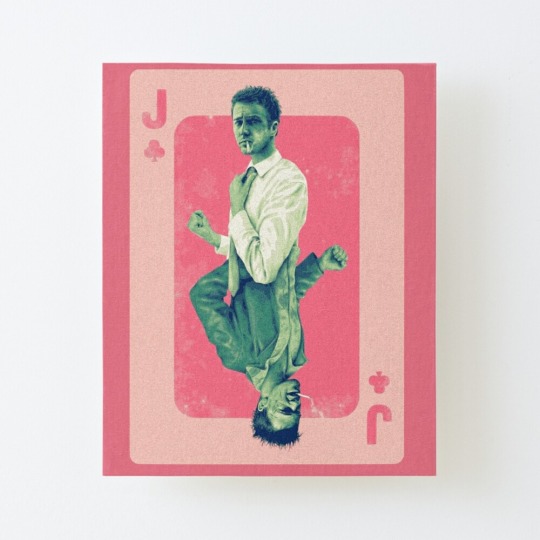
Directed by David Fincher and based on the 1996 film of the same name, Fight Club revolves around an unnamed narrator suffering from amnesia, who is discontented with his life until he meets a soap maker named Tyler Durden, whom he forms a friendship with.
Both men start a fight club and the narrator gets embroiled in a relationship woman named Marla Singer. However, everything is not what it seems, as the narrator finds out the group is out of control and after a major revelation, he realizes there is only one way out. Looks like we're going to break the first two rules of Fight Club. Over the last twenty years, Fight Club has been considered to be one of the most controversial and talked-about movies of all time and developed a cult following. It received polarizing reviews at the time and was a box-office failure, but soon found commercial success thanks to its DVD sales and the movie's themes managed to remain relevant even today. Fight Club remains David Fincher's finest work in his impressive filmography, as he's able to adapt certain aspects of the novel while keeping the themes intact, while showcasing the effects of toxic masculinity and consumerism in our society. The cinematography by Jeff Cronenweth is wonderful and the editing helps compliment the story. The score by The Dust Brothers is one of the most iconic soundtracks in cinema, as it features many memorable tracks, such as "Who is Tyler Durden?" and "Jack's Smirking Revenge". The screenplay manages to remain faithful to the source material and it features some of the most quotable lines in cinema history. Edward Norton delivers an exceptional performance as the Narrator, as he is able to convey a sense of desperation and paranoia to his character and it's easily one of the best performances in his career. Brad Pitt is iconic as Tyler Durden and his chemistry with Norton is superb, as both actors manage to play off each other. He also delivers awesome quotes throughout the film and never manages to outstay his welcome. Helena Bonham Carter manages to charm as Marla Singer and supporting actors, such as Meat Loaf (RIP) and Jared Leto were also good in their roles. Overall, there's a reason why Fight Club is still talked about years after its release. The film had become a staple in pop culture, thanks to its memorable quotes and its depiction of mayhem, chaos,
2 notes
·
View notes
Text
Movie Review: Indiana Jones and the Dial of Destiny
Has there even been an action movie hero as good as Indiana Jones? It’s a rhetorical question, but the fact that you’ve just thought about it means that Dr. Jones is easily #1 if not in the Top 5 action movie characters of all time! The very first Indiana Jones movie Raiders of the Lost Ark was released in June 1981. It marked the first collaboration between the cinematic icons director Steven Spielberg, producer/creator George Lucas, and star Harrison Ford. What I wouldn’t give to have been a fly on the wall as these three were on set making this epic action adventure. When I was 5 years old, this was released in theaters and being the Star Wars fan I was, I wanted to see it. But I got kind of scared in the first few minutes, so my Mom took me to Superman II in the next cinema over instead. Years later, after I saw the 1984 prequel Indiana Jones and the Temple of Doom, I re-watched Raiders and loved it. In English class in Junior High we did a whole dissection of the story and characters of Raiders and I had an even deeper appreciation for it. In 1989, Indiana Jones and the Last Crusade was an adventure with Indy and his father that I saw opening weekend and loved. After traveling to Venice, Italy I had an even stronger respect for filming of the action scenes there. In 2008, a later-in-life Dr. Jones gets into a new Cold War adventure in Indiana Jones and the Kingdom of the Crystal Skull. That one gets the worst wrap of them all it’s not as bad as everyone thinks. Bottom line, even when it’s bad, it’s still better than most adventure movies. Raiders stands as a near-perfect film: just one epic action set piece after another. Now the sequel from director James Mangold Indiana Jones and the Dial of Destiny opens this week.
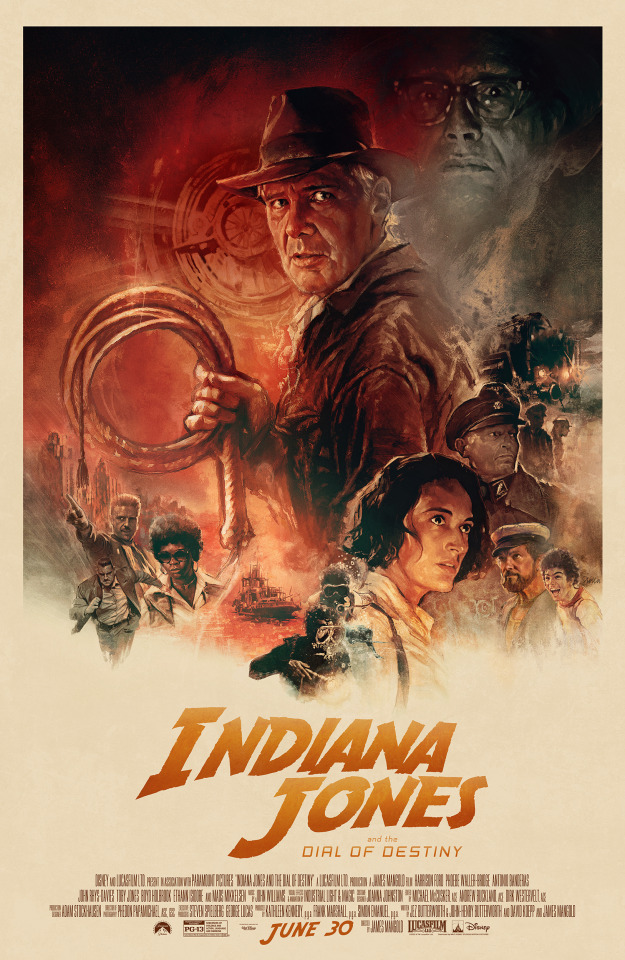
movie poster
Here’s the plot overview to the best of my ability to not spoil: In a prologue during the Allied liberation of Europe in World War II in 1944, Indiana and colleague Basil Shaw (Toby Jones) are captured by the Nazi’s and Nazi scientist Jürgen Voller (Mads Mikkelsen) has found half of Archemedes Dial, which can enable time travel. Skip ahead to 1969, Dr. Jones is now divorced and he’s about to retire as a college professor. He is now a grumpy old man (you almost expect him to quote Dana Carvey’s SNL character or Clint Eastwood’s Gran Torino character). He is approached by Basil’s daughter who is also his God-daughter Helena (Phoebe Waller-Bridge) and she is after the half of the dial. But then as Voller and his goons are after Indy, Helena makes a run for it and Indy chases after her. They find themselves banding together, even if suspicious of the other, to find the other half of the dial. There’s also brief appearances from old friend Sallah (John Rhys-Davies) and ex Marion Ravenwood (Karen Allen, who I interviewed in 2017).
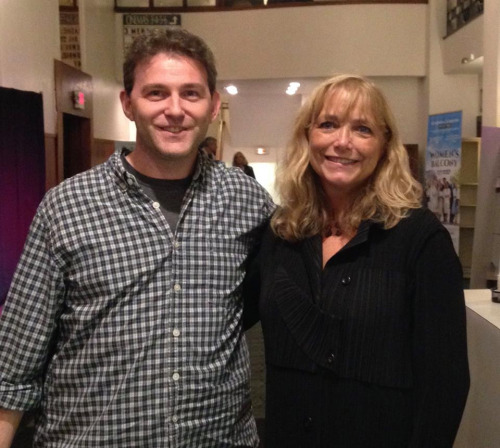
me with Karen Allen, who plays Marion Ravenwood, for an interview in 2017
One of the biggest complaints fans had about Indy 4 was that aliens do not belong in Indiana Jones’ movies. While you do have to suspend disbelief at the thought of one man taking on an entire army in chase after chase and an ark that makes Nazi’s heads explode, it is based in history and aliens make it sci-fi. Here with Indy 5, the haters are going to be unhappy that time travel is finding its way in. It’s not far from the historical themes of the previous films IMHO. The script is, well, not perfect and it’s definitely lacking Spielberg and Lucas. James Mangold is an able director (re-watch Cop Land or Walk the Line if you doubt it) and he is definitely bowing at the altar of Spielberg, but storywise it feels like it was made by a committee as opposed to a singular vision. Biggest complaint I have is Helena. Why did they have a daughter of a close friend we are only now learning about be the anchor for this story? I think a much better move would’ve been if it was the daughter of Short Round and that also would’ve brought back Ke Huy Quan (how cool would that have been?) and for the audience it would’ve been a deeper connection to the older films. Now that I’ve complained, let me just say it was definitely better than Indy 4 and boy is the nostalgia on full blast! Seeing Harrison Ford back as Indiana Jones...well, he could read the phone book in that hat and whip and it’d probably be exciting. This doesn’t rank nearly as high as Indy 1-3 and at times I wanted to just re-watch Raiders, but when it gets going and Indy is outrunning the bad guys on a horse in NYC, you know it’s going to be a fun ride, even if it can’t live up to its own legacy. There’s been loads of sequels and reboots lately, but this one had the biggest shoes to fill and it couldn’t possibly fill over 40 years of watching and re-watching a classic, but I give credit for trying. Again, a bad Indiana Jones movie is better than most adventure movies and having Harrison Ford at 80 give this legendary character a send off is worth seeing!
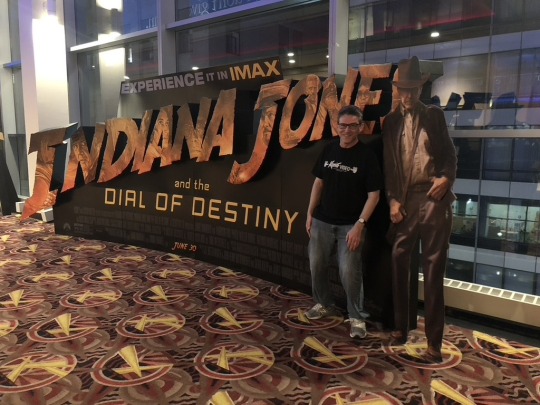
me hanging with Indiana Jones
For info on IJATDOD: https://www.lucasfilm.com/productions/indiana-jones-and-the-dial-of-destiny/
3.5 out of 5 stars
#indiana jones and the dial of destiny#indiana jones#james mangold#steven spielberg#george lucas#raiders of the lost ark#indiana jones and the temple of doom#indiana jones and the last crusade#indiana jones and the kingdom of crystal skulls#film geek#movie review#karen allen
0 notes
Text
It’s a strange thing… When I hear mentioned the “violent trans woman” stereotype in media representation, I think the two that come up most are “Psycho” and “Silence of The Lambs.” This makes sense in my eyes, in both films the characters are killers (violence taken to its extreme), and in both films the character in question isn’t really described in a way that lines up with the reality of most trans people, but instead in a way that lines up with transphobic stereotypes.
But while those come up the most, they’re certainly not the only ones I hear about. There’s not a wealth of them, but there IS a history of film representation that ranges in quality, for better or worse. My point of this post is why, in terms of notoriety, I never hear about Myra Breckinridge (the film version). The movie was notorious from a film critic perspective, and maybe that’s why it doesn’t come up a lot; it wasn’t loved enough in the minds of the masses to influence their views. But even still, as hated as the movie was, and considering the ENTIRE plot, I find it strange I’ve never seen it come up ONCE in discussions of queer media on this site.
Since I’ve learned about it, I’ve gathered that it has more presence in more “scholarly” settings, but even still I am confused because it feels like the kind of movie this site would go wild over in terms of heated debate. Instead, looking up the title in the tags, all I get is promotional images and a couple of quotes. Frankly it’s probably for the best; I for one am not a fan of discussing things we don’t like with no goal to the conversation; it’s a practice of misery. Still, it’s very strange to me that it doesn’t seem to be well-known on here. Strange indeed. ¯\_(ツ)_/¯
#cw transphobia#myra breckinridge#Myra Breckinridge 1970#queer representation#warning in case this post gets you curious to watch the film#there IS a r*pe scene
0 notes
Text
Owner
I took that camera everywhere with me. Never upgraded either, I always just kept that one because it had sentimental value. I’d even go as far as saying that it was part of our family for all the memories that it was a part of. Margret would always get mad when I used to take the camera out and start filming vacations, family gatherings, book club, funerals, everything. Most people didn’t like that it was one of those things that would always come with me everywhere I went. In this life, my sole desire was to be able to look back and see all of the beautiful moments that came out of it, even the bad ones. There was one time when I was with my brother and he just received the news that his wife had passed away, and I recorded his reaction. I hope when I died, someone recorded Margaret's reaction.
…
When I was younger, I always wanted to be a filmmaker, an artist. It took some convincing to not pursue it, but I was really close. Instead, I went into accounting in college, which is where I met Margret. Times back then were nice, and as a man of many quotes, I strongly believe in the saying “Everything happens for a reason,” but there was always a “What if…” in the back of my mind. I regret not even trying. The pursuit to my dream was abandoned so young that it hurts to think back at it.
I fell in love with cinema at a young age because my dad was a failed actor. I don’t know if you could even call him an actor because he could never break through the barrier of background characters to main characters. The type of characters people would base their entire personality off of. Regardless, whatever part he would score, whether it be a walking background extra or a couple lines having extra, my family would gather together and watch it as if he was one of the main characters. This is where my fear of failure in the showbiz erupted. I saw how unhappy my father was in those living room movie premieres we would have. The jealousy he possessed, as he thought “I could act better than those guys.” It was despicable, how can you say you could be better than someone, if you aren’t as successful as them. If you are aware that this gap of skill is present between someone at a higher status than you, why don’t you reach that status. Maybe I’m just overthinking things.
Although being dead for a while makes you lose all fear and worry, it doesn't change your personality. I used that camera as a coping mechanism to shy away from uncomfortable situations and I hope that it stays in close proximity to when anyone ever reminds them of me. The history that materialistic objects possess is one that I will never get over. The good, the bad, and the horrific all witnessing the same thing as its owner, is baggage that only something without emotions can deal with. It is plenty hard when you have them.


0 notes
Note
so I watched brief encounter last night because I was curious... I don’t understand what the main character meant by her committing the violence of falling inlove. I don’t think I understand how being in love could be violent- is it because she’s married?
hi anon! ahhhh! im so happy you decided to watch it! and then came to discuss with me pls do you know how delighted that makes me ;^; if youre not used to classic cinema, or even classic melodrama, i can see how the film would be a bit slow or a bit difficult to connect with. so i really appreciate you taking the time to watch and come up with questions for things. when i say this made my day i mean it lmaooo
the quote i believe youre pulling from is this:
I’ve fallen in love. I didn’t think such violent things could happen to ordinary people.
there are several layers to this statement - emotional, moral, political, societal, etc. im happy to break these down contextually so you can have a better understanding of why this statement is painful and, also, why love is an extremely violent experience. going under a cut because...i have this entire masters degree in film and im not using it so im gonna use it here lmao
at its most basic, yes, you are correct. she says love is a violent experience because she is already married. to love, really love, is an act of violence, especially when you are already promised and making a family to another person. there is an element of ruination here that plagues laura, love as a threat to the stability of the home and family. and we can see this when her son is playing in the street and gets into an accident - a completely innocuous event, but one she sees as an omen of her violence against her own family. karma, but at a level that would start a war among her family and community.
in most filmic universes, romantic comedies especially, we are used to the relatively easy expectations that come from learning to love someone - you meet, you flirt, you are both, ideally, free to experience these types of intense emotions, you come together, you separate (due to...any sort of obstacle), you come back together. in this traditional narrative, we are presented with the notion that falling in love happens in a linear fashion and that, once the two characters have ended their arc and achieved their happy ending, there is not much else that occurs. they lived happily ever after, ever after being an indeterminate amount of time in which we are meant to assume they exist within this state, ceaselessly.
in general, there are two types of love stories - tragedies and comedies. where romantic comedies (in the modern sense, and i am stressing modern sense) end with ‘happily ever after,’ the other alternative for lovers is death. you either overcome your initial obstacle, or you perish, in love, where love becomes a death. so where does that leave brief encounter? neither party have been put to death, but the death is of the will, the passion. and, in brief encounter, it is killed by morality. by choice. i will be coming back to this. because passion is an extremely important element of this film, and it carries the narrative from start to finish.
at its core, brief encounter is a melodrama. melodrama has its own sect of film theory, but in this case ill do my best to keep it simple. and its really important to recognize that this film is british - british melodrama are two extremely different experiences and come from two completely different places of expression.
american melodrama, the most broad sense, was a stylistic set of films, usually from the 40s-50s (even some released in the early 60s) which use a lot of the tropes of classic cinematic narrative story telling - but as irony, parody, or pastiche. great examples of these films would be rebel without a cause, mildred pierce, from here to eternity, imitation of life, etc. in all of these films, and again i am paraphrasing because there is so much relating to melodrama as its own theory and practice, there is an onus on emotional expression and sensationalism. the narrative is driven by passionate action, emotional action, and, almost always, the swell of music weve come to recognize in hollywood cinema. music swells with character emotion, thus assisting in informing the audience in how to feel, and so we are ok regardless if these characters are successful in their plight, because we have felt.
british melodrama operates from an entirely different perspective. yes, like their historical theatrical roots, they favor spectacle and avoid realism. and, again, there is a reliance on the music to lead the narrative. however, the focus shifts from the societal body to the familial body; body concrete rather than body politic. culturally, this is a significant change from the usual reserved emotional experience within britain. and that is where brief encounter becomes something extremely important.
brief encounter was released in 1945, in a post-war period when there were significant changes to womens daily and societal lives, and this film really hones in on the causative anxieties that are born from these sudden changes and, yes, sudden notions of emotional liberation from their families - a new found independence. with the context of this film coming off the tails of WWII, in a post-war society in which there is meant to be peace, laura calls the act of falling in love violent which, for an audience member at the time of release, would have immediately associated that element of violence with war time violence. love is a threat. its dangerous. love at this level is repulsive. love is an insurrection - love is a revolution. and it came to her without her permission. she is bereft. she is on the brink of collapse - and ordinary women, the traditional family house wife, is never meant to feel so eager to ruin her family for a sensation that is, inherently, selfish.
so this brings us back to passion. something that comes up quite a lot in brief encounter, most explicitly at the cinema when alec and laura see a trailer for a film called flames of passion (this is a real film btw! and you might be able to watch it - it too is a melodrama. theres also a queer reading within brief encounter, because of the inclusion of flames of passion, but thats for another day). this brings us to the moral question of love as violence. for this, we can turn to hume and his 4 thesis on moral philosophy, the morals that drive humanity. primarily we will look at the following points:
1. reason alone is not enough to motivate the will, but rather is a slave to passion
3. moral distinction is derived from moral sentiment: feelings of approval (praise) and disapproval (shame, blame) through our inter-relations with others, or through the perceptions of others as they perceive us
for hume, the passions are simply emotions, but they are broken down as direct or indirect. desire is a direct emotion and it arises, without thought, from a place of good or evil, pain or pleasure - and it is only after these feelings have arisen that we are able to consider the feeling. by that same token, bodily or carnal appetites, our carnal desires, is another instinct that arises from unknown origin and only is able to be thoughtfully experienced after we have been confronted with it. and that is the most important piece - desire and carnal desire is an instinct. for hume, love, on the other hand, does not directly cause action - because love is not an instinct. love is learned.
in brief encounter, laura is admitting that not only does she thoughtfully love alec - love in a way that would not necessarily cause action, but brings her unparalleled pleasure in comparison to a man who simply helps, but she desires him. desires him enough to take action, to release the shackles of her political body and engage in her carnal body, with an appetite that is almost reductive in theory, aligning her with something base. this pleasure inherently causes her pain, yet still, she craves it - without morality.
and through her perception of those around her - her friends, her acquaintances, her own husband - she distinguishes this moral experience as shameful. but, in that shame, she still does not surrender her carnal body. her apetite is awakened, unable for her to be returned to its normal, thoughtful state. at war, now, with herself and her desires, laura is conflicted and ruined, simply because she learned to love and to desire, a violence an ordinary housewife should never experience.
#the cutest anons!#this was literally so much longer than it really needed to be#but i hope you understand now why that quote is literally so painful#why its one of the most quoted lines in film history#there are still so many layers to this#i didnt even talk about concerto no 2 and the agitation of the score#the violent swell and laura enacts violence against her heart#and her heart enacts violence against her mind#youre right anonie that its violent because shes already married#but the context of the film and the moral propriety of post-war england#makes that line an earthquake :(#Anonymous
15 notes
·
View notes
Video
'Loki' takes over: Tom Hiddleston on his new TV series and a decade in the MCU
Ten years after Hiddleston first chose chaos in Thor, Marvel’s fan favorite God of Mischief is going even bigger with his time-bending Disney+ show.
Tom Hiddleston is Loki, and he is burdened with glorious purpose: After playing Thor's puckish brother for over a decade in the Marvel Cinematic Universe, no one understands the mercurial Asgardian God of Mischief as well as the actor. He can teach an entire seminar on Loki if given the opportunity — which he actually did during pre-production on his forthcoming Disney+ show. In conversation, Hiddleston quotes lines from his MCU debut, 2011's Thor, almost verbatim, and will playfully correct you if you mistakenly refer to Asgard's Rainbow Bridge as the Bifrost, which is the portal that connects Loki and Thor's homeworld to the Nine Realms, including Midgard, a.k.a. Earth. "Well, the Bifrost technically is the energy that runs through the bridge," he says with a smile. "But nine points to Gryffindor!" And when he shows up to the photo shoot for this very digital cover, he hops on a call with our photo editor to pitch ways the concept could be even more Loki, like incorporating the flourish the trickster does whenever magically conjuring something. The lasting impression is that playing Loki isn't just a paycheck.
"Rather than ownership, it's a sense of responsibility I feel to give my best every time and do the best I can because I feel so grateful to be a part of what Marvel Studios has created," the 40-year-old Brit tells EW over Zoom a few days after the shoot and a week out from Thor's 10th anniversary. "I just want to make sure I've honored that responsibility with the best that I can give and the most care and thought and energy."
After appearing in three Thor movies and three Avengers, Hiddleston is bringing that passion to his first solo Marvel project, Loki, the House of Ideas' third Disney+ series following the sitcom pastiche WandaVision and the topical The Falcon and the Winter Soldier. Led by head writer Michael Waldron (Doctor Strange in the Multiverse of Madness, Heels), the six-episode drama sees Hiddleston's shapeshifting agent of chaos step out from behind his brother's shadow and into the spotlight for a timey-wimey, sci-fi adventure that aims to get to the bottom of who Loki really is. "I wanted to explore slightly more complex character questions," says Waldron. "It's not just good versus bad. Is anybody all good? Is anybody all bad? What makes a hero, a hero? A villain, a villain?"
Even though Loki — who loves sowing mayhem with his illusion magic and shapeshifting, all with a major chip on his shoulder — has never been one for introspection, the idea of building an entire show around him was a no-brainer for Marvel. When asked why Loki was one of the studio's first Disney+ shows, Marvel president Kevin Feige replies matter-of-factly, "More Hiddleston, more Loki." First introduced as Thor's (Chris Hemsworth) envious brother in Kenneth Branagh's Thor, Loki went full Big Bad in 2012's The Avengers. That film cemented the impish rogue as one of the shared universe's fan favorites, thanks to Hiddleston's ability to make him deliciously villainous yet charismatic and, most importantly, empathetic. The character's popularity is one of the reasons he's managed to avoid death many times.
"He's been around for thousands of years. He had all sorts of adventures," says Feige. "Wanting to fill in the blanks and see much more of Loki's story [was] the initial desire [for the series]."
The Loki we meet on the show is not the one who fought the Avengers in 2012 and evolved into an antihero in Thor: The Dark World and Thor: Ragnarok before meeting his demise at the hands of the mad titan Thanos (Josh Brolin) in 2018's Avengers: Infinity War. Instead, we'll be following a Loki from a branched timeline (a variant, if you will) after he stole the Tesseract following his thwarted New York invasion and escaped S.H.I.E.L.D. custody during the time heist featured in Avengers: Endgame. In other words, this Loki hasn't gone through any sort of redemption arc. He's still the charming yet petulant god who firmly believes he's destined to rule and has never gotten his due.
Premiering June 9, Loki begins with the Time Variance Authority — a bureaucratic organization tasked with safeguarding the proper flow of time — arresting the Loki Variant seen in Endgame because they want his help fixing all of the timeline problems he caused while on the run with the Tesseract. So there will be time travel, and a lot more of it than in Endgame. As Loki makes his way through his own procedural, he'll match wits with new characters including Owen Wilson's Agent Mobius, a brilliant TVA analyst, and Gugu Mbatha-Raw's Judge Renslayer. The question in early episodes is whether Loki will help them or take over.
"One of the things Kevin Feige led on was, 'I think we should find a way of exploring the parts of Loki that are independent of his relationship with Thor,' or see him in a duality or in relationship with others, which I thought was very exciting," says Hiddleston, who also serves as an executive producer on the show. "So the Odinson saga, that trilogy of films, still has its integrity, and we don't have to reopen it and retell it."
Yet, in order to understand where Loki is going, it's important to see where he came from.
Hiddleston can't believe how long he and Loki have been connected. "I've been playing this character for 11 years," he says. "Which is the first time I have said that sentence, I realize, and it [blows] my mind. I don't know what percentage that is exactly of my 40 years of being alive, but it's substantial."
His time as Loki actually goes a bit further back, to 2009 — a year after Robert Downey Jr. big banged the MCU into existence with Iron Man — when he auditioned for Thor. It's no secret that Hiddleston initially went in for the role of the titular God of Thunder, but Feige and director Kenneth Branagh thought his natural charm and flexibility as an actor made him better suited for the movie's damaged antagonist. "Tom gave you an impression that he could be ready for anything, performance-wise," says Branagh, who had previously worked with him on a West End revival of Checkov's Ivanov and the BBC series Wallander. "Tom has a wild imagination, so does Loki. He's got a mischievous sense of humor and he was ready to play. It felt like he had a star personality, but he was a team player."
Hiddleston fully immersed himself in the character. Outside of studying Loki's history in the Marvel Comics, he also researched how Loki and the Trickster God archetype appeared across mythology and different cultures. "He understood that he was already in something special [and] it was a special character in a special part of that early moment in the life of the Marvel universe where [he] also needed to step up in other ways," says Branagh, who was impressed by the emotional depth Hiddleston brought to the part, especially when it came to how isolated Loki felt in the Asgardian royal family.
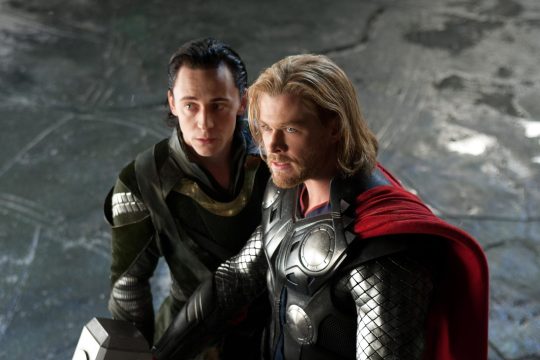
There was a lot riding on that first Thor feature. For one, no one knew if audiences would immediately latch onto a Shakespearean superhero movie partially set on an alien planet populated by the Norse Gods of legend. Second, it was integral to Feige's plans for the shared universe. Loki was supposed to be the main villain in The Avengers, which would not only mirror how Earth's mightiest heroes joined forces in 1963's Avengers #1 but also give Thor a believable reason for teaming up with Iron Man, Captain America (Chris Evans), and the rest of the capes. Feige first clued Hiddleston into those larger plans when the actor was in L.A. before Thor started shooting.
"I was like, 'Excuse me?' Because he was already three, four steps ahead," says Hiddleston. "That took me a few minutes to process, because I didn't quite realize how it just suddenly had a scope. And being cast as Loki, I realized, was a very significant moment for me in my life, and was going to remain. The creative journey was going to be so exciting."
Hiddleston relished the opportunity to go full villain in Avengers, like in the scene where Loki ordered a crowd to kneel before him outside a German opera house: "It's the unspoken truth of humanity, that you crave subjugation," says the Machiavellian god. "The bright lure of freedom diminishes your life's joy in a mad scramble for power, for identity. You were made to be ruled. In the end, you will always kneel."
"I just knew that in the structure of that film, I had to lean into his role as a pure antagonist," Hiddleston recalls. "What I always found curious and complex about the way Loki is written in Avengers, is that his status as an antagonist comes from the same well of not belonging and being marginalized and isolated in the first Thor film. Loki now knows he has no place in Asgard."
Loki did find a place within the audience's hearts, though. Feige was "all in" on Hiddleston as his Loki from the beginning, but even he couldn't predict how much fans would love him. Feige recalls the reaction at the 2013 San Diego Comic-Con: "Did we know that after he was the villain in two movies, he would be bringing thousands of people to their feet in Hall H, in costume, chanting his name? No, that was above and beyond the plan that we were hoping for and dreaming of." It was a dream Feige first got an inkling of a year earlier during the Avengers press tour when a Russian fan slipped past security, snuck into Mark Ruffalo's car, and asked the Hulk actor to give Hiddleston a piece of fan art she created. "That was one of the early signs there was much more happening with this quote-unquote villain."
Despite that popularity, the plan was to kill Loki off in 2013's Thor: The Dark World, but the studio reversed course after test audiences refused to believe he actually died fighting the Dark Elves. Alas, he couldn't out-illusion death forever. After returning in Taika Waititi's colorful and idiosyncratic Thor: Ragnarok, Hiddleston's character perished for real in the opening moments of Infinity War. In typical Loki fashion, before Thanos crushed his windpipe, he delivered a defiant speech that indicated he'd finally made peace with the anger he felt toward his family.
"It felt very, very final, and I thought, 'Okay, that's it. This is Loki's final bow and a conclusive end to the Odinson saga,'" says Hiddleston, who shot that well-earned death scene in 2017.
But, though he didn't know it yet, the actor's MCU story was far from over.
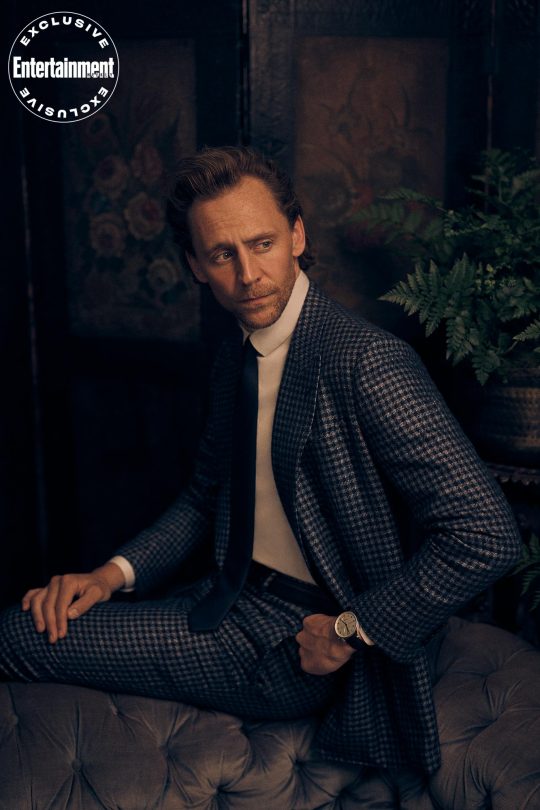
Credit: Charlie Gray for EW
When Hiddleston returned to film two scenes in Avengers: Endgame in 2017, he had no idea where Loki portaled off to after snatching the Tesseract. "Where'd he go? When does he go? How does he get there? These are all questions I remember asking on the day, and then not being given any answers," Hiddleston recalls. To be fair, it's likely the Powers That Be didn't necessarily have answers then. While Feige can't exactly recall when the writers' room for Endgame first devised Loki's escape sequence, he does know that setting up a future show wasn't the primary goal — because a Loki series wasn't on the horizon just yet.
"[That scene] was really more of a wrinkle so that one of the missions that the Avengers went on in Endgame could get screwed up and not go well, which is what required Cap and Tony to go further back in time to the '70s," says Feige. Soon after that, though, former Disney CEO Bob Iger approached Feige about producing content for the studio's forthcoming streaming service. "I think the notion that we had left this hanging loose end with Loki gave us the in for what a Loki series could be. So by the time [Endgame] came out, we did know where it was going."
As for Hiddleston, he didn't find out about the plans for a Loki show until spring 2018, a few weeks before Infinity War hit theaters. "I probably should not have been surprised, but I was," says the actor. "But only because Infinity War had felt so final."
Nevertheless, Hiddleston was excited about returning for his show. He was eager to explore Loki's powers, especially the shapeshifting, and what it meant that this disruptive figure still managed to find a seat beside the gods in mythology. "I love this idea [of] Loki's chaotic energy somehow being something we need. Even though, for all sorts of reasons, you don't know whether you can trust him. You don't know whether he's going to betray you. You don't why he's doing what he's doing," says Hiddleston. "If he's shapeshifting so often, does he even know who he is? And is he even interested in understanding who he is? Underneath all those masks, underneath the charm and the wit, which is kind of a defense anyway, does Loki have an authentic self? Is he introspective enough or brave enough to find out? I think all of those ideas are all in the series — ideas about identity, ideas about self-knowledge, self-acceptance, and the difficulty of it."
“The series will explore Loki's powers in a way they have not yet been explored, which is very, very exciting.”
The thing that truly sold Hiddleston on the show was Marvel's decision to include the Time Variance Authority, a move he describes as "the best idea that anybody had pertaining to the series." Feige and Loki executive producer Stephen Broussard had hoped to find a place for the TVA — an organization that debuted in 1986's Thor #372 and has appeared in She-Hulk and Fantastic Four stories — in the MCU for years, but the right opportunity never presented itself until Loki came along. "Putting Loki into his own procedural series became the eureka moment for the show," says Feige.
The TVA's perspective on time and reality also tied into the themes that Waldron, Loki's head writer, was hoping to explore. "Loki is a character that's always reckoning with his own identity, and the TVA, by virtue of what they do, is uniquely suited to hold up a mirror to Loki and make him really confront who he is and who he was supposed to be," says Waldron. Hiddleston adds: "[That] was very exciting because in the other films, there was always something about Loki that was very controlled. He seemed to know exactly what the cards in his hand were and how he was going to play them…. And Loki versus the TVA is Loki out of control immediately, and in an environment in which he's completely behind the pace, out of his comfort zone, destabilized, and acting out."
To truly dig into who Loki is, the creative team had to learn from the man who knows him best: Hiddleston. "I got him to do a thing called Loki School when we first started," says director Kate Herron. "I asked him to basically talk through his 10 years of the MCU — from costumes to stunts, to emotionally how he felt in each movie. It was fantastic."
Hiddleston got something out of the Loki school, too. Owen Wilson both attended the class and interviewed Hiddleston afterward so that he could better understand Loki, as his character Mobius is supposed to be an expert on him. During their conversation, Wilson pointedly asked Hiddleston what he loved about playing the character.
"And I said, 'I think it's because he has so much range,'" says Hiddleston. "I remember saying this to him: 'On the 88 keys on the piano, he can play the twinkly light keys at the top. He can keep it witty and light, and he's the God of Mischief, but he can also go down to the other side and play the heavy keys. And he can play some really profound chords down there, which are about grief and betrayal and loss and heartbreak and jealousy and pride.'" Hiddleston recalls Wilson being moved by the description: "He said, 'I think I might say that in the show.' And it was such a brilliant insight for me into how open Owen is as an artist and a performer.'"
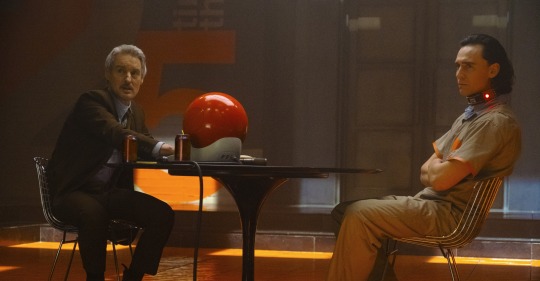
Owen Wilson as Mobius and Tom Hiddleston as Loki in 'Loki.'| Credit: Chuck Zlotnick/Marvel Studios
Everyone involved is particularly excited for audiences to see Hiddleston and Wilson's on-screen chemistry. "Mobius is not unlike Owen Wilson in that he's sort of nonplussed by the MCU," says Feige. "[Loki] is used to getting a reaction out of people, whether it's his brother or his father, or the other Avengers. He likes to be very flamboyant and theatrical. Mobius doesn't give him the reaction he's looking for. That leads to a very unique relationship that Loki's not used to."
As for the rest of the series, we know that Loki will be jumping around time and reality, but the creative team isn't keen on revealing when and where. "Every episode, we tried to take inspiration from different things," says Waldron, citing Blade Runner's noir aesthetic as one example.
"Part of the fun of the multiverse and playing with time is seeing other versions of characters, and other versions of the titular character in particular," says Feige, who also declined to confirm if Loki ties into Doctor Strange in the Multiverse of Madness and/or other upcoming projects.
Making Loki was especially meaningful to Hiddleston because they shot most of it during the pandemic, in late 2020. "It will remain one of the absolute most intense, most rewarding experiences of my life," he says. "It's a series about time, and the value of time, and what time is worth, and I suppose what the experience of being alive is worth. And I don't quite know yet, and maybe I don't have perspective on it, if all the thinking and the reflecting that we did during the lockdown ended up in the series. But in some way, it must have because everything we make is a snapshot of where we were in our lives at that time."
While it remains to be seen what the future holds for Loki beyond this initial season, Hiddleston isn't preparing to put the character to bed yet. "I'm open to everything," he says. "I have said goodbye to the character. I've said hello to the character. I said goodbye to the character [again]. I've learned not to make assumptions, I suppose. I'm just grateful that I'm still here, and there are still new roads to explore."
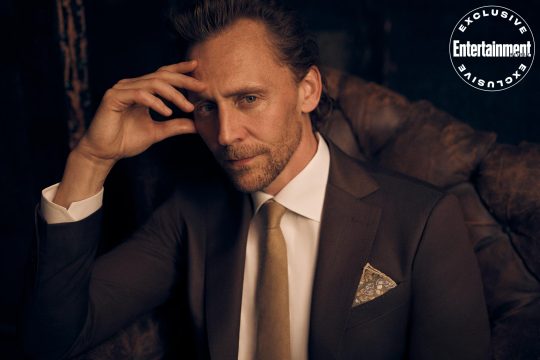
519 notes
·
View notes
Text
IOTA Reviews: Wishmaker

Goddamn it...
It's bad enough Astruc tastelessly axed Lukanette, but now he just had to show up to give a sarcastic eulogy at the funeral.
Let's get into the fourteenth (chronologically the eighteenth) episode of Miraculous Ladybug's fourth season: Wishmaker
Right out of the gate, we get a “Chloe bad” joke with her insulting Marinette for being poor or whatever as she hands out flyers for an upcoming career fair. Chloe doesn't have much of a role in the episode, but she will be important towards the end, trust me. We also get a funny “Marinette stares lovingly at Adrien” joke while she sees him, so it's good the writers are at least trying to get their strange habits out of their systems now instead of later.
While reading over the flyer in his room, Adrien ponders a possible career as he doesn't want to keep being a model.
(The episode came out in English first, so I'm just going to be using quotes instead of screenshots of subbed scenes for this review)
Plagg: Don't you wanna continue to model?
Adrien: I don't think so, Plagg. I'm doing it now because my father asked me to. But now I realize I don't know what I'd want to do. I've never asked myself that question.
This is a really interesting dilemma for Adrien. Unlike other episodes that just have him feel sad for entirely superfluous reasons like Ladybug turning him down or generally moping about his mom, it feels like something you can really understand. He genuinely isn't sure what he wants to do with his life because he's had everything chosen for him before. I also like the use of the English dub saying Adrien modeled because his father asked him to, as if he couldn't actually say no. I also like how Adrien is still starting to lose faith in Ladybug for giving out Miraculous to everyone, which makes even more sense after his view of her was shaken in the previous episode chronologically, “Rocketear”. I also like how Plagg suggests ideas for a career for Adrien, like the two of them opening up a cheese shop together, which shows how Plagg cares for Adrien and wants what's best for him, ultimately highlighting how healthy their relationship is. He's almost like a big brother who gives advice to Adrien, even if it isn't the most sound advice at times.
On the other hand, Marinette already knows what she wants to do with her life, but the Kwamis start to argue over what she actually means by it by saying they know what she wants to do, a painfully accurate metaphor for the writers dictating Marinette's actions no matter how inconsistent they are.
Pollen: What's a career, dear Guardian?
Marinette: Oh. Well, it's... your job! Something really important that you do and gives meaning to your life!
Roaar: Oh! So, your job is being the Guardian of the Miraculous!
Mullo: Of course not! It's being a student!
Xuppu: Not at all! It's making presents for Adrien!
Marinette:Well...
Longg: She said “something important”, like when she crafted the big doll house to hide the Miracle Box!
Wayzz: Or when she designed the alarm for this room! What a masterpiece!
Marinette: Sure, I love crafting but—
Ziggy: You guys don't get it! What gives meaning to her life is to be in love with Adrien, or Luka, that's her job!
Fluff: Luka's the one with the guitar, right?
Kaalki: Her real career is being Ladybug and carve her name in history by her glorious deeds, of course!
Of course, their bickering somehow makes Marinette realize she isn't sure what she wants to do in the future after all.
We then cut to a reality show hosted by TV personality, Alec Cataldi. He's generally an asshole to the people on the shows he hosts and takes pleasure in humiliating or just being a dick to them, making you wonder how he still gets work with that attitude. Basically, he's the Alec Baldwin of the Miraculous Ladybug universe. The current show he's hosting is one where he roasts people for their jobs, making Andre a target by pointing how counterproductive his “business” is.
Alec: Here's a perfect example: Andre, the Ice Cream Maker, the ice cream man that is never around! Let me remind you how this goes: Andre doesn't have a shop, no one knows where he is, it takes forever to find him, and he gets to pick a flavor of your ice cream! You've gotta be kidding, Andre! Give me one reason why I should bother to chase after you when I could get my choice of ice cream in any corner supermarket!
Andre: Well, people don't just come for ice cream when they find me. They come to share their love and experience of magical moments! A supermarket cannot do what I do! I am a creator of magical moments!
Alec: “Creator of magical moments?” You've gotta be kidding!
I'm pretty sure that's what a lot of people thought of Andre when they first saw “Glaciator”. The idea behind Andre is that he chooses ice cream for you representing something about yourself, so he gives Alec a scoop of lime to represent his sour exterior and chocolate cinnamon to represent the dreams he still has within. Alec flinches a little at the ice cream, presumably because of how terrible of a combination that is, and decides to go to commercial to think.
Marinette talks to Andre about what he does, and he explains he used to be an office worker, with the only highlight of his days being making ice cream for himself after work. It eventually inspired him to quit his job and start making ice cream for everyone. It's a nice backstory, and I think a lot of people watching who are struggling to think about their future can relate to this like with the earlier scene with Adrien. It's also a nice touch for the flashbacks to reveal Andre has served ice cream to some of France's most famous couples.
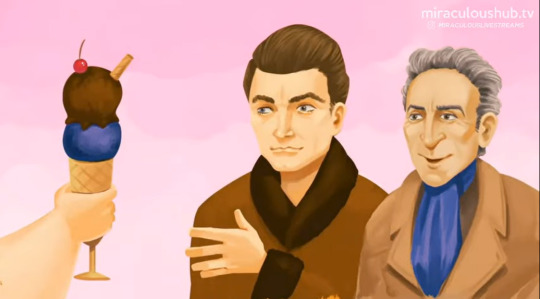
(Jean Coutau and Jean Marais)
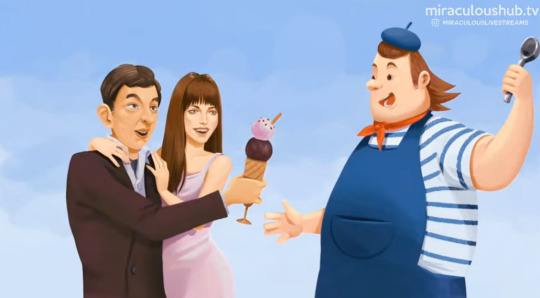
(Serge Gainsbourg and Jane Birkin)
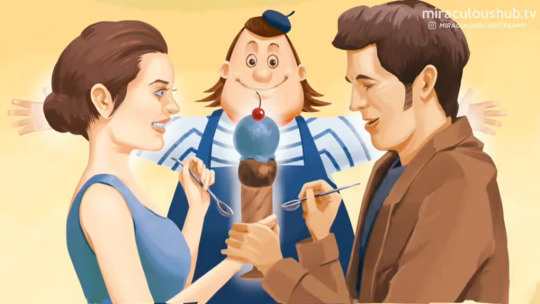
(Marion Cotillard and Guillaume Canet)
Granted, I'm wondering how old Andre is to have even met some of these people given Jean Cocteau died in 1963, but seeing how Master Fu is 186, I'm guessing the Miraculous Ladybug universe just has really good healthcare. Either that, or the people in this universe take Jay Kordich's diet very seriously.
Andre gives some ice cream to Marinette, who is soon joined by her ex-boyfriend who she never loved according to the writers. Actually, judging from her face when Luka talks about the very first guitar he made, the writers made another 180 regarding Marinette's feelings for Luka.

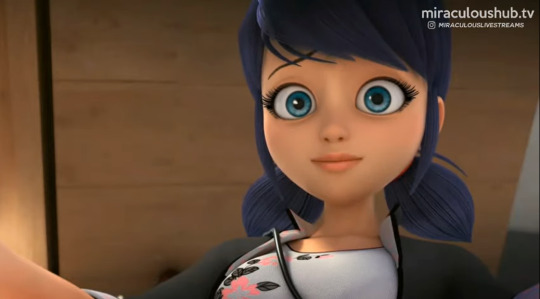
Of course, because the show wants to remind the audience Alec still exists, he makes fun of Luka for taking two years to perfect the delicate craftsmanship it takes to sculpt any instrument when you can just download an app on your phone. Your inner boomer is showing, writers, even if you were born after the time period for that generation. Luka retorts with some vague philosophical line he's known for that's one of the reasons why people are so mixed on him as a character
Luka: Musical instruments fill the space and space fills the instruments. No phone in the world will ever be able to do that.
Despite it being incredibly confusing, it gets to Alec, causing him to run off in tears. Luka and Marinette continue to talk, but it turns out that's Adrien decided to sit down nearby because of course he did. Though, like the last scene, it's a pretty interesting one as the three discuss what they want to do with their lives. There's also a really nice visual of a blimp with an ad Adrien was in passing by while Adrien talks about his father dictating his life, a really nice symbol. Of course, the scene is somewhat ruined by Luka suddenly deciding to be an Adrienette shipper.
Luka: You two will eventually find what's already in front of you, but you can't hear it clearly. Just let the melody flow.
He's referring to their uncertainty of their futures, but earlier on, Luka wanted to help Marinette be honest with her feelings about Adrien, and even before that, Andre was saying that Marinette and Luka didn't have to be in love to enjoy his magic ice cream. It's here when I realized this episode is subtly trying to end any chances of Lukanette still happening with so many little details. Right when the two spend time together, that's when they decided to help Adrien who showed up for no reason, preventing them from potentially coming to terms with their feelings for each other or at the very least discuss how hard it is to be friends with their history. And things only get more frustrating towards the end, where you'd swear someone decided to smother Lukanette with a pillow in its sleep.
Back to Alec, he's roasting a wig salesman (does he even have permission to film any of these people?) for his job, but as soon as the salesman puts a wig on him, Alec immediately gives us his life story.
Alec: When I was a kid, I used to have long hair, but everyone made fun of me. That's why I shaved it all off. I've been making the wrong choices my whole life. My TV shows are nothing personal. I make fun of people when they make fun of me when I was a kid. (Starts to tear up) I should've been the person I always wanted to be, trying to change the world instead of mocking it! (Falls on his knees) I've wasted my life!
I didn't paraphrase this at all. This is seriously what happened. He goes from mocking everyone he meets, to slightly doubting himself after seeing an ice cream vendor and a young musician, and then he starts having an existential crisis about his tragic backstory. It's not a bad idea, but if there was some more buildup in previous episodes, I'd understand. But this goes from confusing to straight out insulting towards the end. I'll get to that later on.
Shadowmoth notices Alec's emotions and akumatizes him into Wishmaker through his microphone.

Wishmaker has a pretty cool design. The grey skin color coupled with the mostly black outfit really highlights Alec's broken heart, and he looks pretty sinister. His powers... leave a lot to be desired. Like the name states, Wishmaker has the power to make everyone's childhood dreams come true, like this one guy's dream is to be Santa Claus, so he transforms into Saint Nick without any hitch. Wouldn't it make more sense if Wishmaker twisted the dreams of his victims like a genie and made them miserable while they ironically lived out their fantasies by twisting around their words? Instead, all of his “victims” seem pretty happy, which doesn't really do much to make him a threat in my opinion.
So the aforementioned Santa starts dropping presents like bombs near Marinette, Adrien, and Luka, and they're separated by a giant robot. Marinette quickly transforms into Ladybug, and gets Luka to safety, though as soon as she leaves, Luka goes to check on where he told Marinette to stay for safety, and doesn't see her there. Instead, he sees his deadbeat father (transformed into a crocodile) drowning and goes to save him.
Ladybug meets up with Cat Noir (who transformed off-screen) and the two easily incapacitate the robot before engaging Wishmaker, avoiding his blasts. Apparently, they'll get their secret identities revealed if they get hit, so Ladybug goes to get Luka to help out as Viperion while Cat Noir holds off Wishmaker. Ladybug goes to get Luka, leading to the funniest joke in the episode.
youtube
She gives Luka the Snake Miraculous and he transforms into Viperion, immediately activating his Second Chance. For newcomers, Second Chance allows the user to set a point in time when activating it and if something goes wrong, they can go back to that checkpoint in up to five minutes. Ladybug also summons her Lucky Charm, a stuffed dinosaur toy.
Back with Cat Noir, as he engages Wishmaker, the Akuma starts to tempt him with the idea of living out his childhood dream, because he genuinely doesn't remember his. As Shadowmoth orders Wishmaker to use his powers on Cat Noir, Ladybug and Viperion show up, but in the chaos of the fight, Ladybug gets hit by Wishmaker, revealing her childhood dream as the “Knitting Fairy”, and exposes her identity to Viperion, who uses Second Chance to undo the timeline.
In the new timeline, Cat Noir's vulnerability gets to him, so he willingly lets himself get his by Wishmaker, not only exposing his identity as Adrien, but tragically reveals his childhood dream, to be whatever his parents wanted him to be. I feel like this works a lot better than some of the other moments where Cat Noir defied orders or screwed around on the battlefield because it's clearly framed as a moment of weakness on his part, and it was naturally built up over the course of the episode. The reveal of Adrien's childhood dream is a real gut punch too, as it shows just how much Adrien's life has been controlled by his family.
In the third timeline, Viperon deflects Wishmaker's blast meant for Cat Noir and redirects it toward a man whose childhood dream was to become a giant stuffed dinosaur. The stuffed dinosaur in question goes to give Wishmaker a hug, restraining him long enough for Ladybug to steal for Cat Noir to cataclysm (It's a microphone, how hard is it to break???) before she de-evilizes the Akuma. Ladybug uses Miraculous Ladybug to force everyone to stop living out their childhood dreams, she gives Alec a Magical Charm, and Luka decides not to tell Ladybug he knows both her and Cat Noir's secret identities. Why did Ladybug expect Luka not to know her identity when the whole reason she recruited him was to make sure nobody else found out her identity?
Now, while it isn't outright said, it's hinted at that now that Luka knows Marinette is Ladybug and Adrien is Cat Noir, judging from his dejected look after finding out the latter, he may be giving up on all attempts at the idea of getting back together with Marinette, and may or may not start shipping the Love Square now, just like how Kagami decided to ship Adrienette in “Mr. Pigeon 72”. I'm not saying the idea of Luka knowing someone's identity is bad, but it feels like this only happened specifically to stop him from having feelings for Marinette because now he knows Adrien loves her alter ego, and vice versa. Maybe it'll be touched upon in a later episode, but this was just a dick move by the writers in terms of ending all chances of Lukanette like this in order to ensure the Love Square has absolutely no competition.
So the episode ends with Marinette and Adrien deciding to focus on their futures while Alec starts a new show where he helps people live out their childhood dreams, albeit dressed like Style Queen for some reason.


Eh, he still picked a pretty cool Akuma to dress up as in my opinion. A lot of people have viewed this ending as evidence Alec is a drag queen with how he dressed up, coupled with the fact that he said something that was very similar to famous drag queen RuPaul.
Alec: And now, we're gonna love one another, starting with everyone loving themselves! Because how are you gonna love other people if you don't love yourself?
youtube
Though Astruc, being Astruc, once again decided to be vague when asked about the subject on Twitter, though at least the subtext is better than when he said he didn't make Juleka and Rose girlfriends because of censors while making it seem like a noble act.

Overall, this was a really good episode, though there were some underlying issues that really kept me from actually liking it. For the most part, it had some good drama with the main character, a rare scene where Marinette didn't stammer around Adrien, a creative (albeit flawed) Akuma with some good action, and an interesting idea with Luka knowing everything about the Love Square now.
There are just two big problems that really got to me about this episode. Let's get the obvious one out of the way, Luka. Honestly, he really didn't need to be in the episode. Sure, he gave some sound advice to Marinette and Adrien about their careers, but it felt kind of strange to see someone their age talking to them about their future when Andre, someone who actually had experience struggling to figure out what he wanted to do with his life, was pushed to the side. And like I said earlier, I think the only reason Luka found out about Marinette and Adrien's identities was to discourage him from thinking about getting back together with Marinette. After all, now that he realizes how “made for each other” they are, he can't stand in the way of the Love Square.
The problem is that in the context of the episode, we don't really see what made him see things that way. At least in “Mr. Pigeon 72”, Kagami consistently viewed Marinette's attempts to get her and Adrien back together as a subconscious desire to be with Adrien. It was dumb with how she decided to go to Team Adrienette at the end of the episode, but it was something. I'm glad the episode didn't force in too many Love Square shenanigans, but I think more should have been done to contextualize Luka's feelings towards the reveal. I get the writers wanted to make sure Lukanette had no chance of coming back, but this just feels rushed.
And then there's Alec's redemption arc. While it's not a bad idea in concept, the problem is that it flies in the fact of a recurring theme this season, that being redemption. Because, here's the funny thing: Alec blatantly said he became an asshole TV personality because of his history of bullying, and decided to retaliate as a result, but he eventually saw the error of his ways and turned over a new leaf. For long time readers of this blog, I apologize for bringing this up yet again, but what exactly makes this different from everything Astruc said about Chloe? You know, when he said that you make your formative choices when you're fourteen? Just like how Alec decided to become a reality TV host making fun of people after a troubling experience from when he was a kid?

Let's say that I agree with Astruc's views about Chloe. How is Alec different from what Astruc's said about Chloe for almost two years at this point? What makes Chloe, someone who was the victim of a troubled childhood who never got help, an irredeemable monster while Alec, someone who also had a troubled childhood and had even more time to get help while never getting any, capable of change? I thought he Alec made a formative choice when he was young and stuck with it, just like how Chloe started to fully develop at the age of fourteen. I mean, Astruc, you yourself said that Chloe's troubled childhood “was no excuse to treat people like shit”, according to you.

I'm just saying, dude, if Chloe can't be redeemed because of the stuff you yourself said, then that shouldn't apply to Alec either. When you really think about it, it's almost like Astruc either made up a bunch of excuses to not redeem Chloe, or he's a massive hypocrite for going back on his word. You can't really justify this kind of hypocrisy relating to Alec's redemption when you remember just how much of a hardass Astruc was when explaining why redemption was impossible for Chloe.
This coupled with the treatment of Luka really drags this episode from really good to blatantly insulting to certain viewers. Then again, these two choices just got to me personally. I feel like if those two things weren't there, things could have made this episode a lot better for me personally. I can see why a lot of people in the fandom still like this episode, but I'm honestly not a fan of it.
#immaturity of thomas astruc#iota#thomas astruc#thomas astruc salt#miraculous ladybug#miraculous ladybug salt#marinette dupain cheng#ladybug#adrien agreste#cat noir#chat noir#luka couffaine#viperion#chloe bourgeois#queen bee#queen b#gabriel agreste#hawkmoth#hawk moth#shadowmoth#shadow moth#alec cataldi#wishmaker#plagg#roarr#mullo#xuppu#longg#wayzz#ziggy
294 notes
·
View notes
Note
so I’ve wondered this since the trailer came out years and years ago and Chloe defended the movie - was the red shoes teaser written by the same team that made the movie? were they forced to market it like that, was that based on an earlier draft, etc?? not sure if you know but you seem like the leading expert!
Sorry, this is gonna be an absolute novel because you know I’m an animation fan and the history and production of Red Shoes and the Seven Dwarfs is SO interesting and insane. Like, Tangled levels of insane. Thanks for calling me an expert, no one else was gonna do it so I just kind of took up the helm lol.
Here’s the low-down... The timeline of the movie’s production is an absolute mess and kind of an extremely wild ride. It was in production for ten years, went through a lot of different crew members, and went through at least two other major versions of the story before landing on the final version.
Since there’s not a ton of info on the movie’s production, a lot of this is pieced together from different interviews and context clues, and also a lot of what I’ve read and what I am quoting has been translated from Korean, sometimes pretty roughly. But yeah.
Here’s the story of why the Red Shoes and the Seven Dwarfs teasers and poster were so, so bad and fatshame-y and the actual movie was so, so good and body-positive. (With pictures and production artwork!)
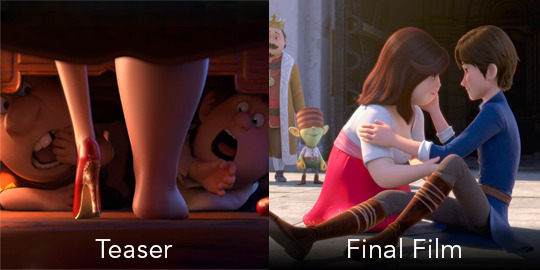
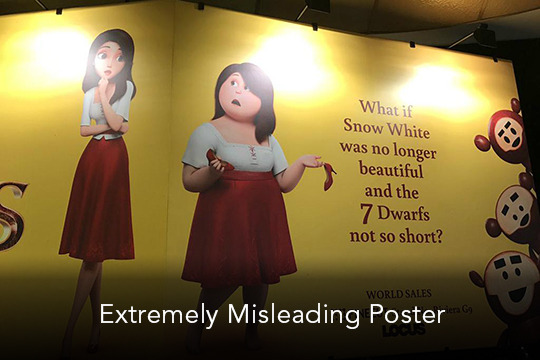
(This is a beast of a post so I’m putting it under a cut.)
All right, so. After its conception originally as a short story by the South Korean studio Locus Creative in 2009-2010-ish, Red Shoes and the Seven Dwarfs was being worked on and was set to come out in Summer 2017, as evidenced by this poster at the 2015 Cannes Film Festival, featuring a different logo and very different character designs for most of the dwarfs.
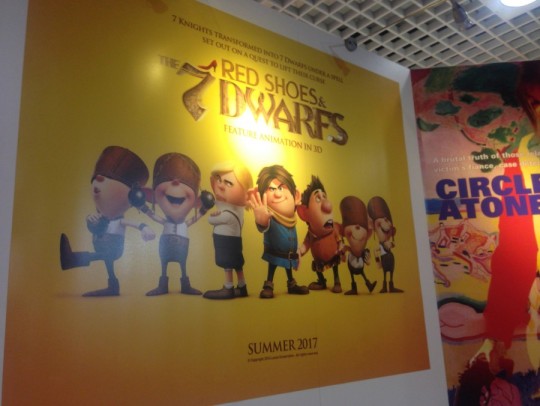
In early-mid 2016, the first teaser (in which we see Snow White undress and then two dwarfs recoil in horror at her fatness when she takes her magic shoes off) was released, after the film had kind of been slowly chugging along for 6 or so years. (I am having such trouble pinpointing when the second teaser was released (in which one of the dwarfs basically attacks Snow while she is sleeping to steal her shoes), but I believe it was around the same time.) The teasers didn’t get that much traction because this was a small film from a small indie studio in South Korea.
None of the final actors had been cast yet. At this point in the production, the story was different, one of the many versions that the movie went through. As in the final movie, the dwarfs were actually cursed knights/princes and Snow White switched back and forth between two body types due to her magic shoes, but in this version, the dwarfs needed to steal the shoes from her in order to break their curse (rather than needing “a kiss from the most beautiful woman in the world” like in the final movie).
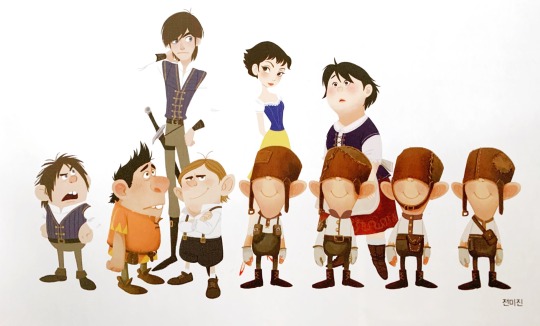
The weird thing is, I believe they had JUST changed the movie’s story when the teaser came out. I’m almost positive it was released more as a proof of concept than as an actual trailer for the movie. They had just recently combined two separate characters (seen above), a typical pretty, skinny princess character (Snow White) and a cute chubby girl character (’Bonnie’), into one single character that switches back and forth between the two appearances when she wears the magic shoes (also they had just dropped literally half of the movie taking place in the real world, with a magic mirror portal, it was a whole thing).
They didn’t have the details of this aspect of the new story hammered out yet, and the first pass at presenting Snow’s magically changing body type, was, yeah, not good and super offensive. This was a really inexperienced indie studio making their first film on a low budget, so even the animation and voice acting wasn’t great. I think they just wanted to get SOMETHING out there because it had been 6 years and they wanted to have something to show for it.
But here’s the thing. Despite how the teasers make it seem, this was always supposed to be a movie about body positivity, letting go of appearance-based prejudices, and loving yourself and others for who you are and for who they are, which we see in the final film.
I like to think of our film as a kindhearted one. Our intentions are nice.
- Director Sung-ho Hong
It’s important to keep in mind that this movie was made in South Korea by a 99% Korean crew, and, as I understand it anyway, in Korean culture, ‘fatshaming’ is not really a thing that is seen as overtly offensive. Also, children’s media there seems to have more adult things in it than in the US, which probably accounts for the more risque parts of the teasers. That said, I really believe that at this point in the timeline, the movie was on-track to be bad (or at least not very good) when it was released, and it would have ended up bad IF a few key players hadn’t signed on (which I’ll get to in a moment).
Interestingly, the movie’s producer, Sujin Hwang, said in a 2017 interview:
“[Both teasers] were solely produced to induce curiosity. They’re completely irrelevant to the actual story.”
- Producer Sujin Hwang
I think what she was trying to convey was that neither one is a scene in the actual movie, because while the teasers didn’t reflect the revamped story as it existed in summer 2017 (the time of the interview), they DID reflect the earlier version of the story where the dwarfs wanted her shoes, which is what the story was at the time they were made.
Now that we’re in post-teaser 2016, HERE’S where things start to turn around. After the teasers were released, my guy Disney veteran and native Korean Jin Kim joined the project. He and Red Shoes director Sung-ho Hong had been buddies for about eight years and Sung-ho had been trying to get Jin to come to Seoul and work with him at Locus for a long time, and he finally succeeded.
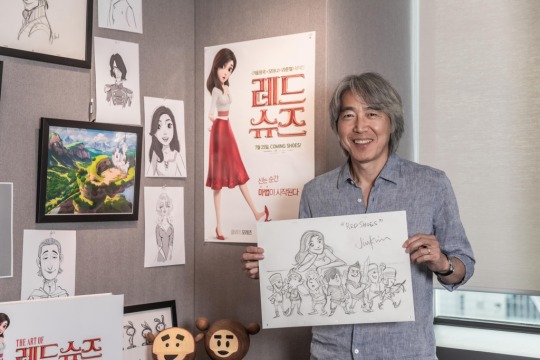
Jin and his twenty years of Disney experience as an animator and senior designer on films like Tangled, Frozen, Big Hero 6, Zootopia, and Moana, had a HUGE HUGE HUGE influence on the movie. He redesigned almost all the characters, oversaw all the visual development from the moment he signed on, and heavily (HEAVILY) supervised the animation, literally going frame-by-frame through preliminary animations and drawing over them, teaching the inexperienced animators at Locus everything he knew. (Literally almost everyone except him either only had TV experience or had no professional experience because they just gotten out of school.)
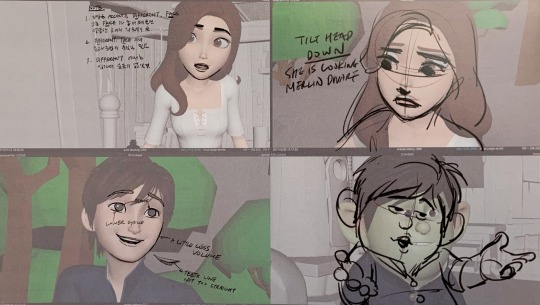
From an outsider’s perspective, it really seems as though Jin joining the project (and his gargantuan effort) made the quality SKYROCKET. Not just in character design and animation, but also in things like effects animation, story, etc. After he joined, Locus really started pushing HARD to make a good, high-quality movie, and his influence and experience from being a prominent figure at Disney was absolutely key. The studio also began to really study Disney films and other well-made animated films from other studios to really try and pinpoint what the DNA of a good animated movie really is.
I don’t have any solid evidence, but I’m pretty sure that Tony Bancroft (an animator and the co-director of Mulan) then joined the project because he’s good friends with Jin Kim. He is only credited as the voice director (the movie was recorded in English and the characters were animated to the English dialogue), but I am SURE that he probably also had a pretty big influence on the movie, because like... How could he not? I really really think there was more to his role than his title would have you believe, even though there’s almost no info out there about it.
So now the movie goes through a gigantic metamorphosis. Character designs, visual development, and animation quality are all rapidly improving, the story is tightening, and the themes of the movie (which, again, were always the same and intended to be positive) are being presented in a more sincere way. The movie is becoming the sweet, self-love-encouraging and body-positive movie that was eventually released.
I’m putting a gif from the credits of the final movie here. As we move into 2017, when the giant eruption of backlash occurred, please keep in mind that the story was finalized at this point and that THIS was the movie people were so mad about:
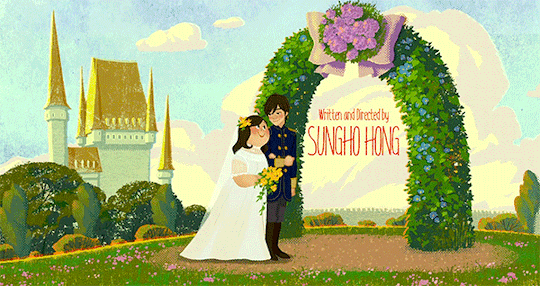
Chloe Grace Moretz accepted the role of Snow White immediately after she read the script and she recorded her lines (I think) in early-ish 2017. Her co-star Sam Claflin also immediately accepted the role of the romantic interest, Merlin, after reading the script and recorded his lines in (I believe) July 2017.
In the summer of 2017, the story and script were more or less the same as in the final movie. Promotional images from that time show that most of dwarfs had been completely redesigned by this point and didn’t have their teaser designs anymore.
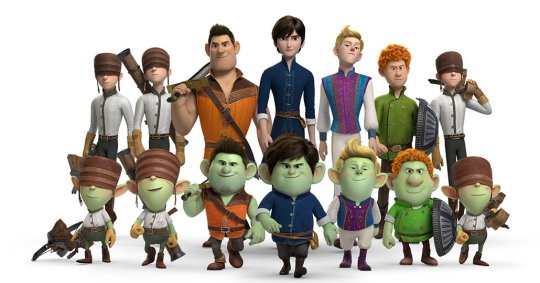
They also released a few screenshots that look exactly like the final film. The movie was advertised as coming out in ‘2018′ at this point. Here’s a promo image from 2017 that is MUCH more tactfully worded than the infamous Cannes poster:
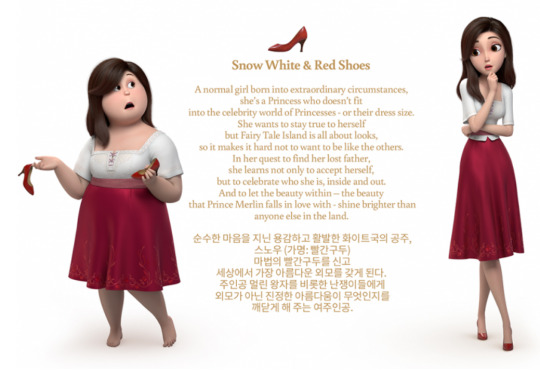
So now we’re in summer 2017. The Cannes Film Festival. The movie’s script and story have been basically nailed down, animation is underway, and the Korean film company Finecut is beginning to market and sell the movie to worldwide audiences. They are planning on showing some footage to potential buyers at the festival, and they make a poster to advertise the film there.
Unfortunately, it’s THIS POSTER:
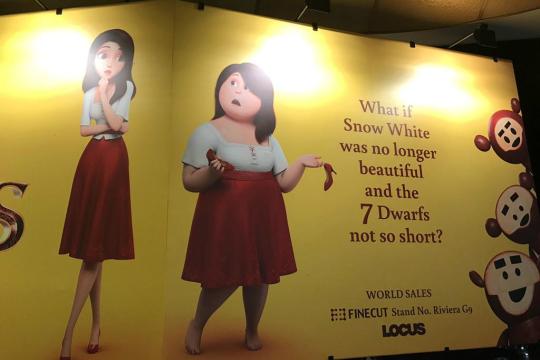
Now here’s where there are some unknowns. By this point, the movie is basically in its final form, which is an adorable, body-positive story about loving people for who they are, loving yourself for who YOU are, and that provides commentary on society’s standards of beauty and how they affect how people are treated/viewed. So why this poster??? All I can really tell is that someone (I think Finecut) really, REALLY messed up and either horribly mistranslated the tagline, or didn’t do enough research to know that this kind of thing is REALLY NOT OKAY in western culture.
The above picture is shared and the internet backlash begins, fueled by tweets from prominent body-positivity activists like Tess Holliday. Even Chloe Grace Moretz speaks out against it, because she of all people KNOWS that that’s not what the movie is about. The internet then finds the old teasers from before the movie was revamped and it makes things worse. Producer Sujin Hwang profusely apologizes and says that that is NOT the message of the movie. Locus pulls the advertising campaign, and takes down the two old teasers.
“Our film, a family comedy, carries a message designed to challenge social prejudices related to standards of physical beauty in society by emphasizing the importance of inner beauty.”
- Producer Sujin Hwang
Voice director Tony Bancroft also tried to explain the situation:
“The truth is the film has a body-positive message as its core theme–it’s the opposite of what reports are saying. The problem is one poorly translated movie poster that has been taken dramatically out of context.”
- Voice Director Tony Bancroft
And then... There was nothing for a while. The movie didn’t come out in 2018 and was delayed. From what I can tell, I DON’T believe this delay was related to the Cannes backlash. I think it was mostly due to Locus’s limited budget and resources, because as we know, animation is difficult, time-consuming, expensive, and easy to do badly but hard to do well. Also, probably with Jin Kim and Tony Bancroft’s influence, they REALLY wanted to make sure to do a good job with the animation because they now had a great story and they really wanted the movie to be a quality, worldwide hit that would kind of put South Korean feature animation on the map. Just take a look at how nice the final animation was:
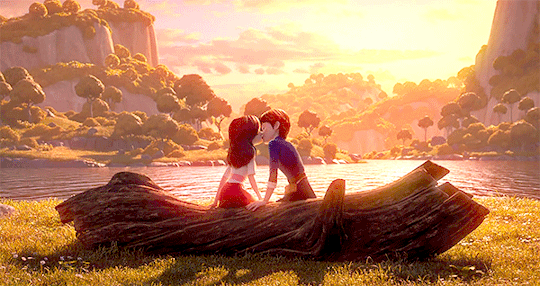
The movie was released in South Korea on July 25th, 2019. Unfortunately, the damage was done in the English-speaking markets and it was not released to an English-speaking audience until June 22, 2020, when it was released digitally in the UK. At the time of this post, there is no set US release date, but the distribution rights were recently bought by Lionsgate and the MPAA gave the film an official PG rating.
So who’s to blame? There’s no good answer. You could blame Locus for making those old teasers. You could blame Finecut for the competely tonedeaf Cannes poster. You could even blame cancel culture for raging against the movie based on one poster and two old teaser trailers without researching what the movie was actually about.
All I know is, it’s a damn shame.
#mooncactus#red shoes and the seven dwarfs#red shoes and the 7 dwarfs#animation#animation production#animation history#red shoes movie#redshoes#jin kim#tony bancroft
4K notes
·
View notes
Note
Hi I’ve been wrestling with smtg for a bit( aka several years) and I honestly wasnt sure where to even start a convo for this and then I saw a brief mention in the comments so here I am. Im like a big Cassandra Clare fan(i am starting to outgrow her stuff but i still read for like past me’s sake) havent gotten into reading fanfic (for another fandom) until lets say recent years like a year ago, and then well like any person who obsesses over smtg i also learned stuff about the author that sounded well, like she wasnt exactly the nicest person. Especially when it came to how she started as a fanfic writer. Im confused though: the way people kinda like say, oh supporting her is bad ya know cuz of how she was kinda shitty (im being vague cuz any time i tried to look up actual like proof i just got angry sounding articles and i wasnt sure if that was like good enough??) and I look at her material now that I personally find relatable(Izzy was the first character I looked at and thought: oh its okay to be feminine AND badass? More context: my part of the world was/ is INCREDIBLY sexist) and I found so much joy in and very much like all the lgbt rep I found in it, people are still referring back to how shes horrible and im just like: i feel like i missed out on smtg everyone knew once but idk where to look to even get more info.
Anyway I mentioned how recently I got into fanfic because until I started following your blog I didnt know all the history behind it and that started to help me figure out some things about how some authors started out.
I dont expect anyone to like gimme a list or smtg like: oh this person is bad bcuz X. Im just wondrring like: why am i constantly told I shouldnt like cassandra clare? when they’ve done so much good for me. (I dont mean to think my experience is the only one or anything either ofc)
I dont mean to come off like im in denial or maybe I am idk i really just dont know where to go for this convo cuz i absolutely want to have it
--
You want my honest answer? Butthurt.
Cassie has gotten many, many chances that other people would have liked, and she has gotten them on the basis of whom she knows, from her publishing contract to her film and tv deals. People don't feel she earned those chances, and they are bitter as fuck. For example, her books got made into a film. It bombed. And then, unlike in most other cases, they went on and made a tv series of the same material. I think a lot of people look at her and see a charmed life, and it disgusts them either out of pure jealousy or because she was always kind of a douchbag.
Cassie's an asshole, but her "crimes" are so incredibly minor compared to Hollywood creeps or even compared to JKR. If you want to keep liking her books, you do you.
--
Now, as for what her "crimes" actually are, they boil down to fandom interpersonal drama, gross e-begging (kind of), and plagiarism.
She got her ass kicked off of FFN for copying lines and even whole chunks from other media and putting them in her HP fic without attribution. She later tried to excuse this by saying her fans were playing 'spot the reference', but I saw fans quoting 'her" lines all the time and not realizing they were borrowed.
She did actually plagiarize. Whether you think this is the crime to end all crimes is another story.
"Laptopgate" and the time fandom bought her an iPod are probably second most serious. CC's apartment was burgled, and she and her roommates lost some computers and things. She didn't directly ask her followers for money, but she didn't have to. A little crying on social media and some active organizing by her friend, and fandom coughed up a whole bunch of money. Something similar happened when she wanted an iPod.
This really doesn't seem like a big deal, does it? The reason it bugged people was that it was pretty obvious she had a lot more resources than many of the people donating. She could have asked her family for help replacing the laptops. I found the whole thing a bit tacky in both cases and thought she sounded like she was fishing for the iPod even if she didn't directly ask her fans to buy it for her, but this is hardly the stuff of undying scandal.
The real reason people remember laptopgate is that a fan with a medical fundraiser tried to get CC's friend to signal boost them, and the friend was dismissive. I do think she handled it poorly. It was also a time when e-begging was a lot rarer than now and when signal boosting was more than just clicking reblog. How much any of that was CC's fault is open to interpretation.
CC was also the unwitting dupe of fandom's most famous con artist, Msscribe, a bully who went after whole swaths of Harry Potter fandom. CC wasn't directly at fault, but her fame and popularity helped this other asshole operate unimpeded. It left a lot of fans disgusted with that whole social circle.
Beyond that, there's a vast list of minor bullshit. CC acted like a celebrity and lorded it over her fellow fans. She pitted her sycophants against each other. She was--and as far as I can tell stayed--an entitled, self-important whiner. Her crying about Shadowhunters not following her derivative biphobic trash books more closely was hilarious, for example. Cry moar about how your boring self insert got sidelined for a better character!
She has some one-off story I remember people being pissed about that is basically her pulling a Not Like The Other Girls and shitting on fandom nerds--or at least, that's how people took it.
CC has also spent a lot of time talking behind people's backs and being a catty bitch--possibly even a bully. But that kind of thing is hard to prove. It's all down to how different people remember and interpret various incidents, and a lot of the people she was shitty to are also major drama queens who don't always inspire much sympathy.
If you stopped reading every author who was rude or self-important at some point, you wouldn't have much left to read.
--
OTW, which runs AO3, also runs a fandom history wiki. You can look CC up there. I think it covers most of the major stuff, including a rumor I had totally forgotten about about her ~doxxing a minor~. (That was Flourish who explains the whole thing themself, and CC did nothing of the sort.)
https://fanlore.org/wiki/Cassandra_Claire
CC's major crime has always been being a privileged jerk. People see her as a Rich Mean Girl and one of us who thinks she's somehow too good for the rest of us. Except, now, she's also a famous author and not really One Of Us anymore. That's why it's so difficult for people to articulate the problem.
I think her work does have some shitty messages, but for me to engage deeply with them, I'd have to go read the whole thing instead of just chortling at a few horrible metaphors and reading other people's salt. Life's too short for that!
Go forth, nonnie, and read the teen books of your heart. CC isn't problematic in a way where you should refuse to give her money.
43 notes
·
View notes
Text
johnny + the nomads lore
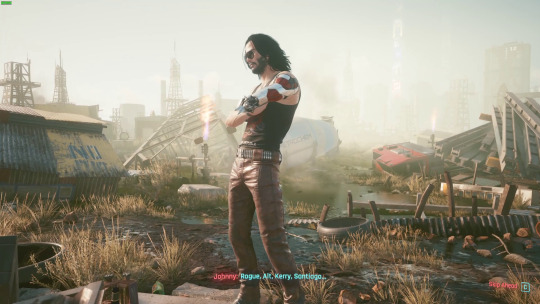
alright, i know this is a screenshots blog but i'm going to go ahead and start dropping some juicy lore tidbits as i dig them up. part of what i'm doing outside of just photo diarying is shard hunting, and BOY is there a lot the game likes to hide in those little shards for idiots like me who like to read so we can write unnecessarily accurate fanfiction!
full disclosure, i know jack shit about the TTRPG/cyberpunk 2020 rulebook except what i read in the wikis.
so here’s my lore roundup so far of everything i know about johnny joining the nomads
we know johnny likes to narrate v’s quest objectives. here’s the first mention where he says it himself:
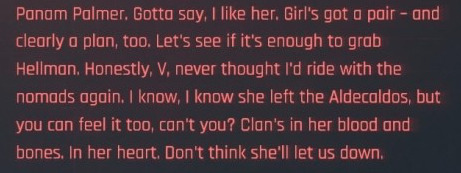
during the voodoo boys quest "transmission" there's a shard in the maglev tunnels beside the ice bath, presumably from brigitte's research into johnny in the first place:
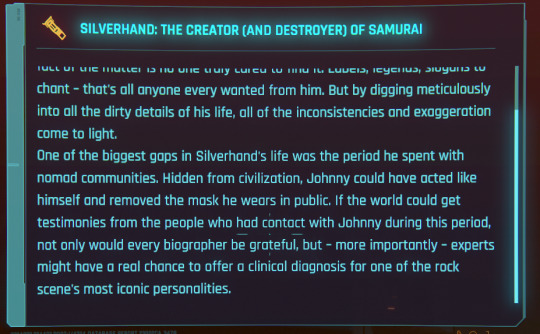
okay, so the timeline is this: johnny joins the nomads after trying and failing to rescue alt. johnny hides out in the badlands for some years. then he and rogue come back to night city and nuke arasaka tower help alt escape the arasaka subnet by uploading liberator to their network once and for all.
this ultimately makes sense. in alt’s flashback, we meet santiago, who is a nomad/connected to nomads, joins rogue and johnny when they're trying to get alt back, and eventually becomes the leader of the aldecaldos.
part of santiago’s TTRPG lore is that he, johnny, and rogue have to lay low in the badlands with nomads after they storm arasaka headquarters (i am aware the game takes many liberties with the original lore so who knows the full accuracy of anything from the original rulebooks)
ENDING spoilers: in the rogue+johnny storming AHQ ending, it's revealed that rogue has a son while they're prepping for the job. if you eavesdrop on her calling him while you're at the afterlife, you hear her tell her son to (paraphrasing here) "pull over and look at the stars", which immediately made my brain go to: nomad, badlands, santiago = dad? maybe. (santiago also canonically has a son according to the TTRPG lore)
this immediately reminded me of another interesting shard that i believe you can find in multiple locations around night city: “"what REALLY happened in arasaka tower?“
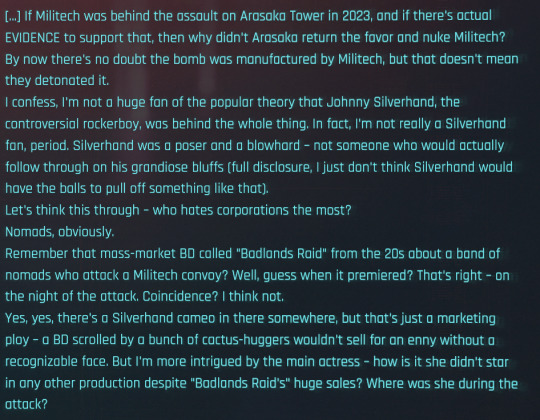
i love this dang shard. at first i thought it was just a cute conspiracy with some juicy gossip (and i love how 99% of the shards that mention johnny in this game are reminding us that he's not a real rebel, he's a poser) but it brings some interesting shit together
one: it tells us where johnny got his hands on the nukes! he and the nomads jumped a militech convoy and jacked some bombs!
which is never directly explained, even as saburo arasaka is interrogating him shortly before using soulkiller. very nice of johnny to protect his homies like that.
...or maybe he didn’t. saburo emphasizes that the dead don’t lie like the living do, and we don’t know what exactly arasaka did to johnny’s construct in mikoshi.
it also explains why the obvious media narrative is that militech nuked arasaka, a nice neat political bow to the end of the fourth corpo wars, which is an entire section of the TTRPG lore that makes my eyes cross when i read it.
it also makes the star/nomads ending extremely interesting, because i originally believed it was the ending where V’s journey deviates the most from rewalking johnny’s path... which also has weird implications if the johnny’s nomad era is being kept from v.
(this also leads into my belief that the star ending/the devil ending are narratively two sides of the same coin, but that’s a WHOLE ANOTHER POST for another day.)
TWO, just straight up the fact that they turned the raid where they actually obtained the nukes into an action flick BD that pretty much ANYONE could watch. who the hell was doing that??
well, who else other than the guy who johnny (optionally) punched the shit out of for filming alt's death: thompson, media guy, and according to rogue, “bad luck”. because you know, recording your crimes is straight up evidence that can be used against you.
during the alt flashback we meet thompson, and just after that in cyberspace before meeting alt, johnny tells v that he has no idea what happened to him and that they never worked together again.
oh, johnny, you lying bastard man
this is blatantly untrue, and if V even had two braincells and better memory than a goldfish they'd know this--in the first flashback sequence where johnny and rogue nuke arasaka tower, thompson is on the comms as they ride the AV towards AHQ, questioning their plans and use of violence.
which leaves me with some questions, like where the fuck is thompson, why does johnny keep lying about this, why doesn't johnny say almost anything about how you interact with the aldecaldo clan nonstop throughout the game when he himself may have been a member of the family for some time?? is he continuing to protect the nomad clan that saved his ass? we know that a lot of his flashbacks are unreliable at best, that johnny changes shit up as desired when presenting V with his memories.
in 2077, you can also find that there’s a remake of “badlands raid” in the shard “new release braindances” that is pretty much everywhere. that shard doesn’t add much, but does mention something along the lines of “many people don’t know the ending of the original” which probably means johnny punched thompson out for filming again, or something.
my running theories: rogue ditched santiago and the aldecaldos with johnny and thompson to nuke arasaka tower, and when johnny died she was stuck looking for (heavily implied by johnny here:) corpo sellout ways to survive.
adam smasher obviously has something to do with this since johnny/rogue's vendetta against the guy isn't entirely clear beyond the smokescreen of "he killed johnny and he sucks". i have done 0 research into this though i'm tired of typing okay
i obviously cannot be certain i have found everything related to this in the game as i’m not even done with this playthrough where i’m trying to pay attention, but i hope this is fun for someone else to dig into.
enjoy, fellow silverhand freaks
EDIT: additional findings
ALRIGHT I HAVE DONE MORE DIGGING AND I AM BACK WITH MORE NOMAD/JOHNNY FINDINGS. these ones are kind of a bummer but VERY interesting.
there’s a shard called “excerpts from a history of the nomads by bb pires” that goes into detail about how nomads came to be
there’s an interesting quote in it: It's hard to imagine a group less inclined to wandering than farmers, but in fact they were the ones who sparked the age of nomads. Natural catastrophes, crops ravaged by bioplagues, armed conflicts and martial law allowing corporations to speculate and privatize land - all this forced them into a life on the road.
when you ask johnny why he wants to take down arasaka, he begins by referencing this himself!!
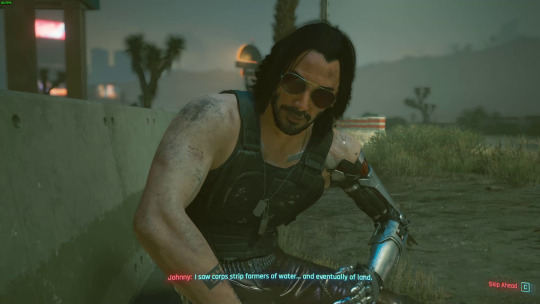
it’s a little awkward to imagine a nomad V doesn’t also know what he’s referencing, but hey, V is the fool because we are as players and that’s only one life path... so sure.
johnny also has unique dialogue during this scene about a nomad origin V, telling them that he’s been trying to understand how V thinks, and came to the conclusion that “their family was a crutch” and essentially made them stupid because they always had a safety net (lmao johnny calling v privileged basically)
BUT this also may reference why johnny would find it confusing as hell that V doesn’t immediately share the views he does when nomads, in terms of values, seem to be more aligned with johnny than V is. but once again V is the fool for a reason and this is all my own speculation so YOU KNOW.
MORE IMPORTANTLY, at the end of chippin’ in, when you ask johnny what he meant by letting down his friends... santiago is named directly

i thought this was interesting since the only glimpse of their relationship that we get is seeing johnny meeting santiago via the alt flashback for the first time.
so now it’s obvious that while johnny and rogue were with the nomads their friendship developed, and johnny went on to disappoint santiago in some way by being his normal dickhead self
but HOW? how did he disappoint santiago? is santiago even still alive?? did smasher kill santiago and is this why rogue mentions during chippin’ in that she wants smasher to “settle a score” moreso than avenge johnny??
the only additional hints i have are from this shard, which you can find at the aldecaldos camp: “nomads at ground zero”
i’m just gonna transcribe here and bold for emphasis:
It was no secret that Night Corp offered generous pay and, in some cases, free cyberware and biomonitor upgrades to anyone willing to help clean up the crater of radioactive rubble at AHQ ground zero. Some firsthand accounts recall the incessant ticking of Geiger counters, like the loud buzz of cicadas in summer. In retrospect, we can only guess how many "crater cleaners" lost their lives to radiation sickness shortly thereafter. Both the city government and Night Corp have claimed casualties were kept to a minimum, while providing no official statistics to substantiate the claim. That being said, they have never been under pressure to release such figures. After all, most rescue, engineering, and rubble cleanup teams were not local Night Citizens, but nomads. Surprised you didn't know? Don't be. It is a fact many history courses tend to overlook.
The city employed hundreds of nomad mercenaries, primarily from clans in Aldecaldo nation. These nomads were hungry for gainful work and the city needed experts who were not only experienced but brave enough to knowingly put their lives on the line - all so Arasaka could one day erect another tower in its place.
But history is not without its sense of irony. These nomads, who so deliberately live outside our so-called "system," came to its very rescue. Not for the first time. And not for the last.
a main theme we find in this game is the idea that the system of corps and exploitation cannot be stopped by grandiose rebellious gestures--no amount of samurai songs, assassinating mayors, or even planting nukes in towers will change things. yet johnny, his friends and mercs at atlantis in the 2020s, including rogue, chose to rebel any way they could, thinking it better than not. johnny criticizes her lack of rebellious spirit CONSTANTLY in 2077.
but ultimately, johnny, trapped in mikoshi, didn’t get to see the outcome of what detonating the AHQ nukes did to night city’s fragile ecosystem. rogue, however, did--and likely watched their former allies, the aldecaldos, be forced to take dangerous work at AHQ’s ground zero (from lack of other opportunities as detailed in this shard), then die from radiation sickness throughout the following decades, all as a result of what she and johnny did to try and fight the system. and she also watched all the former mercenaries of atlantis be hunted down by arasaka.
so rogue sees firsthand what the cost of rebellion is and johnny doesn’t. and nomads, considered the most free of any of the factions we encounter in the game, are the cost.
179 notes
·
View notes
Text
Someone dropped this in my submission box instead of ask box, “So I’m trying to genuinely understand what you’re saying is you understand corporate execs at the CW had a hand in the ending of supernatural? I’m not judging not attacking I swear I’m just trying to make sense of it because I had no idea about any of this up till now because I had stayed out of online fandom because well for years it felt big but anyways am I getting this right?”
---
The CW has a hand in everything. Here’s how this generally works.
The authors have ~relative~ freedom on a show. That is to say, the execs really don’t sit there splitting the nuances of the storytelling the fandom is receiving. They generally don’t even identify major markers that any of us would know (see: not even recognizing what the Roadhouse is.) -- we all knew the original ending had TFW at the Roadhouse as framed and spoiled by 15.04 among other details, and the whole “heaven/mental bar” theme from DSOTM, Nihilism, and Last Call all amplified this as an inevitability--but when you ask about “hey, is there a bar in heaven?” and get a “no?” that tells you they don’t even understand *ancient* plot beats like the Roadhouse, much less the ramifications of what it’s supposed to entail. Oh look at that, the roadhouse was just in fucking heaven like we said, but you identified it as a “cabin” because of filming locations and your basic notes.
Corporate has very basic compliance demands. They expect X, Y, and Z. What X Y and Z are across different shows vary depending on their markets. As long as the authors operate within X Y and Z, the corporate face essentially works off of synopsis of pitches and ideas.
This is also why I’ve talked about queer writing history and people being careful what they call queerbait: you don’t know what their X Y and Z are. The WB for example does not really CARE about representation. I’ve blogged about this often. We’re dollar signs. If they can package a new product to market it explicitly as LGBTQ fare, then they’ll turn you into a revenue machine by feeding you that particular fodder. When it comes to legacy shows--which is funny, because when the suit went off in my DM about this, they used the exact same phrasing as me--they’re going to play it safe, especially if they don’t truly understand the returns from the demographics they’re observing.
The space between X Y and Z is where the authors have liberty to push and, the longer and harder they push, the louder the content is allowed to get.
Here! I’ll even quote them directly, somewhat truncated because they ranted for fucking PARAGRAPHS.
“In reference to the media landscape, on a corporate level we do not distinguish fandoms. [...] That said, legacy shows such at Arrow, Supernatural, and even Flash are relics and we never really endeavored to reinvent the wheel on a corporate level, we are more focused on shows that are newer and still in our pipeline to premiere. [...] As for social media like all businesses and brands the engagement itself is key, but the content of the engagement is mostly irrelevant, though every show does have certain keywords that are often used in conjunction with harsher interactions blacklisted.”
The funny part is, they thought they were preaching to me like this was new information, but those of you that have been around my blog will PROBABLY RECOGNIZE this is almost VERBATIM exactly what I have told everybody over the years. Enough I half-suspect some trolls out there will think i wrote it myself and made it up and lob that accusation around. But there’s about 50 people that watched this conversation as it unfolded.
If you guys get mad? You’re still giving them PR. If you engage the content? You’re giving them PR. If you guys get bitchy ENOUGH? They completely blacklist a certain kind of engagement. I have literally been telling you all of this for years.
They don’t care who you are or what you want, just if you’re watching and what they at-best roughly estimate your demographic as desiring. So for example, Supernatural reading as a largely non-urban white demographic in its viewership, especially with a heavier lean in red states than most shows on the network, they presume to cater to what they perceive that demographic wants, rather than individualizing the understanding of the content, because they do not distinguish the shows or fandoms. “Oh, heavier republican white non-urban demographic” is where their understanding ends at, which is why they’re going to be utterly mystified why even my trump-voting republican neighbor from rural Alabama looked at the end result and went “what the fuck?” -- they weren’t expecting a big gay confession, but they were expecting a different sort of final tone.
Of course they’re never going to take that on for themselves and go “wow, we’re giant blazing dumbasses that understand nothing about the show!” -- they’ll, for example, claim they don’t leave network notes, when they’re still the ones passing material along about demographics and expectations etc etc. Their notes are *basic*. They do not leave *extensive* notes. Because extensive notes require extensive understanding of the content.
So for example: Berens spent since S9 slowly gaying up our show. Since they do not pay attention to the fine details of the story contents (lol no bar in heaven lolololol just a cabin lololol), he never got a note to *stop*. But it was not within the original structure plans and didn’t technically fit the demographic notes. The show continued to get aggressively gayed up, and Berens never really signed a note like “hey, I’m gaying it the fuck up” so even fandom reporters were going “THERE’S NO INTENT THERE!!!!!” -- berens operated in his very basic X, Y, Z landmarks to expand content within a story the suits literally do not pay the fuck attention to.
Corporate’s understanding is basic: dudes stabbing monsters and brothers against the world. Play in that box and keep these demographic notes in mind. You’re good.
They’ll NEVER mention blacklisting issues directly beyond what they admitted in the above quote but I DO remind you I have ranted ON AND ON AND ON how much Destiel fandom shot themselves in the goddamn foot with a fucking bazooka with the Chad Kennedy incident years ago. Others like Emily handled it intelligently to inform the *authors*. No, the network will never tell you if they blacklisted Destiel, but I informed you pretty heavily years ago that odds are, yeah, they probably fucking blacklisted Destiel.
Add in paying attention to the things Berens himself liked (if you don’t believe, scroll to Nov 5 on his tl)

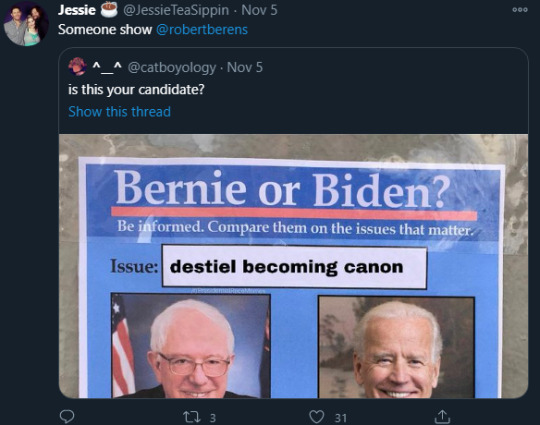
Like, listen. berens knows exactly what he did and did the best he could do in the situations that were set up for him. And, frankly, I had been talking about this season as a writer room rebellion all year--just like corporate DID leave them a note in S11 that they couldn’t kill god. But if they couldn’t kill him or cage him, they would find another way. In 17 we said goodbye to Meredith and, in a way, to a MAJOR portion of Dean’s substantial story. In 18, we said goodbye to Bobo, and frankly all the parts that grew into queer Castiel that came with it. 19 and 20 became residual notes of hitting expected plot beats on the head on a rhythm, tying off godforces, and then just sliding into the Dabb subversion of them having learned to grieve, let go, and process emotions-- just the surrounding delivery left the feeling of more ~wanting~ on that front which is understandable.
But these are the kind of things people don’t even ~think~ about. This is WHY I’ve turned myself into a bulletshield protecting Berens’ work for YEARS while people yelled about queerbait not understanding the years of process he used in his unbabysat space to make something unable to dodge.
More posts he liked:
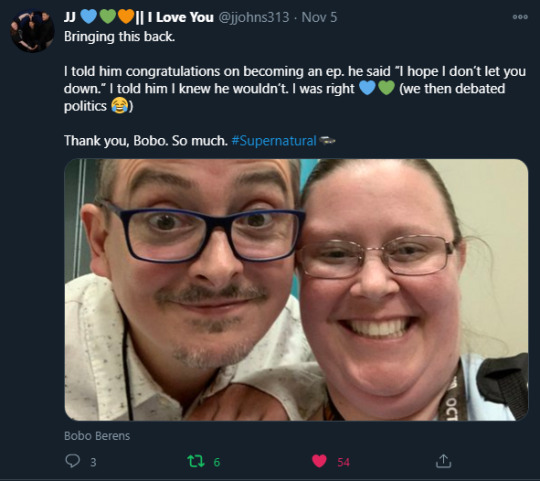
This isn’t a solo story. At the same SDCC he leaned over to my friend and grinned, whispering, “I hope you like what I did this year.” -- he knew. He knew and he fought his ass off but there was an end of the line.
That end of the line having an extra note or two to drop in the finale--never a big gay confirmation, just a “everyone’s there together, assume what you want” --is its own thing. As it is, Jensen even remarked how much of his dialogue got cut in final draft out of 18, and if the brazil dubbing footage leak tells me anything, they got the raw version before it was cut. And before they ADR’ed Dean’s sniffling collapsed against the wall. They had everything right, beyond the fact that there was supposed to be more dialogue from Dean along the lines of, “You can’t go”, or “you can’t leave” (difficult to determine what a ESL person seeing an english draft then yelling in portuguese then translated back to english meant, specifically, but something in that ballpark -- just like “don’t do this” came as “no it’s not” through the translation pipeline), and other similar minor bartering about this. And we’re not even gonna get into Dean’s hilariously loudly ADRed sniffling on the wall. Here, Jensen, breathe IMMEDIATELY into this microphone.
But they’re never going to tell you this. Of course they’re not.
Summarily, corporate had half a year of having to re-manage scheduling everybody’s flights and planners during covid rewrites to stare directly into the huge gay abyss and fuck things up.
It’s all about the unmonitored space vs the monitored space. Of COURSE they’re never going to fucking tell you these things.
FRANKLY I am DYING to see the Portuguese dub of the show to see what the fuck they do with it, all things considered. I’m pretty sure the suit in my inbox that’s trying to vagueblog around things sideways now never accounted for the fact that there’s copies of the raw available in some parts of the world. I’m... pretty sure they thought they were my only leak source in fact.
Either way--it’s not that corporate micromanages and passes constant notes. It’s that they gloss over vague summaries and plans, drop a few base expectations and performance boxes. It’s up to the authors how to kick up dust inside those boxes.
347 notes
·
View notes
Text
I liveblogged that Greg Ellis video and now you can suffer with me

So I did not intend to watch the whole of Greg Ellis’ rant, but I guess I’m a masochist. I ended up liveblogging it so here, you can get the highlights without having to sit through 37:55 like I did.
ETA: Holy shit, it got privated in the time it took me to copy this out. I might be one of the last people to watch it. What did I do to deserve this honour.
holy shit I'm on the video that Greg Ellis did in Cullen's voice and the like-dislike ratio is 124:1.4k
What the fuck this is 37:55 long?????
How did he bitch for 37:55??????????
HOLY SHIT 56 seconds in and he's talking about a 'mob of social justice warriors' wtf????
guys my soul has left my body
"Integrity is earned in turmoil, not simply asserted in comfort" what the fuck is this hasfdk;lsfdajlksfda;lksfda;sfda
HE IS TALKING ABOUT TWITTER DRAMA LIKE ITS A FANTASY WAR I CAN'T
"Join us on this most magnificent morality quest" WHAT
"Help us banish the reputation savages ((savagers?)) and cancel culture hedonists"
sfdsajklsfda this keeps getting weirder what the fuck
"Intellectual glitterati" he can't keep doing this
he can't keep making it weirder
i can't take it
i just can't
he's literally reading an Intellectual Dark Web manifesto in the voice of his character with Dragon Age background music and a bunch of hamfisted references to the dragon age world and general fantasy tropes
HE'S TALKING ABOUT THE CHIVALRIC CODE
"How can men and woman, who are profoundly different from one another, be equals? ~~Chivalry~~~"
I can't he's still voice acting he's acting this like he's actually voicing an emotional scene in the game i fucking can't
THE FUCKING MUSIC RAMPING UP UNDER HIS DRIVELLING BULLSHIT
"Join me, for this new adventure. Like. Follow. Subscribe."
If you aren't listening to this please please just imagine all this said with the upmost sincerity. Like, if you've done Cullen's romance picture it as the voice he used for the really emotional scenes.
Oh fuck I'm gonna listen to this whole thing, aren't I?
He's... he's talking about Johnny Depp and Pirates of the Caribbean
In Cullen's voice
Why is Cullen talking to me about Johnny Depp
He's talking about some time when him and another voice actor tried to hold an event where I guess they could try and launder their image after supporting JK Rowling?
Anyway this leads to him saying: "None of the mob showed up. Why..... WHY???"
THE PREGNANT PAUSES
THE INTERSECTIONAL MOB
OH god another "WHY???"
His voice quavering with OTT emotion
Fuck he really does want to be JBP, huh?
He's literally just bitching about people not showing up to his events now
“THE CANCELLATION OF CULLEN RUTHERFORD”
I CAN'T THIS IS JUST TOO FUNNY
OKay now he's just playing a propaganda film he made about the BLM protests??
Okay back to the cringe now
"In response to one angry mobster, Greg stated that every life has value~~~~~~..."
Okay I have now heard Cullen Rutherford say "All lives matter" with 100% sincerity
"We are living in an era of woke capitalism, in which companies pretend to care about social justice to sell products to people who pretend to hate capitalism."
Okay but like... you know that the 'capitalism' part of that is the problem and not the 'social justice' part right?
"Vile and LIBELOUS messages followed. They were posted online by a SELECT FEW..."
ooooooooh he's on to bitchiing about Mark Darrah this ought to be good
"Not to defend Greg or Cullen from the libelous and ridiculous aspersions...."
DUDE YOUR CHARACTER DIDN'T NEED DEFENDING WHAT THE FUCK ARE YOU ON ABOUT????
Okay my chances of ever not hating Cullen have dissolved now, sorry this is all I'll hear when I hear his voice now
"And giving these negative nnnnnnincompoops exactly what they demanded..."
He literally drew out the 'n' in 'nincompoops'
"This post... had 6 likes. One of two comments.... was posted...." *dramatic reveal voice* ".... by MARK DARRAH"
"Mark Darrah... is the worst kind... of corporate coward. He has :’( no code..... of honour :’("
there are 10 minutes left i'm going to die
OKAY i have now heard Cullen Rutherford, commander of the inqusition, say the words "Go woke, go broke"
"One doesn't challenge The Maker.... without consequences"
I think the Maker here is Bioware?????
"Greg and Cullen were summarily lumped together.... and generalised!!!"
DUDE CULLEN IS NOT REAL
YOU CANNOT LUMP HIM IN WITH ANYONE
WHAT THE FUCK ARE YOU TALKING ABOUT
HE DID IT AGAIN
HE PUT "THE CANCELLATION OF CULLEN RUTHERFORD" TWICE
"The racist trolls came out of the woodwork to cancel Cullen, once... and for ALL!"
"I stand... for HUMAN... RIGHTS :’’’’’’’’’’’’(“ IT'S A VIDEO GAME CHARACTER
"BLACK.... LIVES... MATTER.” *long pause* “AND THEY DON'T MATTER MORE..... THAN ANYONE.... ELSE’S."
Yes. Correct. You are correct. Well done.
*insert the ‘You’re Correct Horse’ video*
"I love.... I ~~~~~love~~~~~~.... everyone "
"So yes.... alll... LIVES... DO... INDEED.... MATTER.... TO MEEEEEEE~~~~~~”
"This moment of history is harsh and merciless.... and in this moment.... I'm choosing.... LOVE"
HE'S LITERALLY JUST REPEATED THE 'WOKE CAPITALISM' LINE FROM EARLIER WORD-FOR-WORD
"Mobbing.... is social murder!"
"And by definition.... people cannot survive their own murder!"
(Again, just imagine his voice breaking with ~~~~~~~emotion~~~~~~~ on that line)
"How do we move from hateful to grateful????"
(The worst part is I know that this shit is going to be convincing to some people and that makes me actually sad)
"Exercise from the neck-up, during this.... PANIC-DEMIC!"
HE'S QUOTING CULLEN I FUCKING CAN'T
"As fans eagerly and patiently await the release of Dragon Age 4, and hope for the inclusion of their ~~~~beloved~~~~~~ Cullen"
*vomit*
okay now he's just telling Cullen's backstory?
I'm guessing this is going to lead somehow into the whole "DON'T BE MEAN TO ME FOR THE SHITTY THINGS I DID IN THE PAST!!!!" thing?
Okay no he just... said it and then moved on?
"Only time.... and the Maker... will tell”
THAT’S IT
what the fuck i am going mad help
this video should come with a warning I got sucked in and trapped for half an hour
#dragon age#greg ellis#fandom drama#anti cullen#I know this isn't really about Cullen as a character but I want people who have that tag blacklisted to be able to avoid this#cullen fans please don't hate me for saying I hate cullen#I promise I don't hate people who like him#I just never liked the character#it's not like a moral stance or anything#anyway I think Greg Ellis owes me reparations for the psychic damage I took watching that video
296 notes
·
View notes